Big task


Bethlehem | In the month Christians celebrate the birth of Christ, Illinois attorney Bruce Kugler visited the place where it happened.
Kugler, a member of Living Faith Baptist Church in Sherman, traveled to Israel in late November with his pastor, Adam Cruse. Their main objectives were to share the gospel, encourage local Christians, and share a resolution adopted by messengers to the 2014 Annual Meeting of the Illinois Baptist State Association.
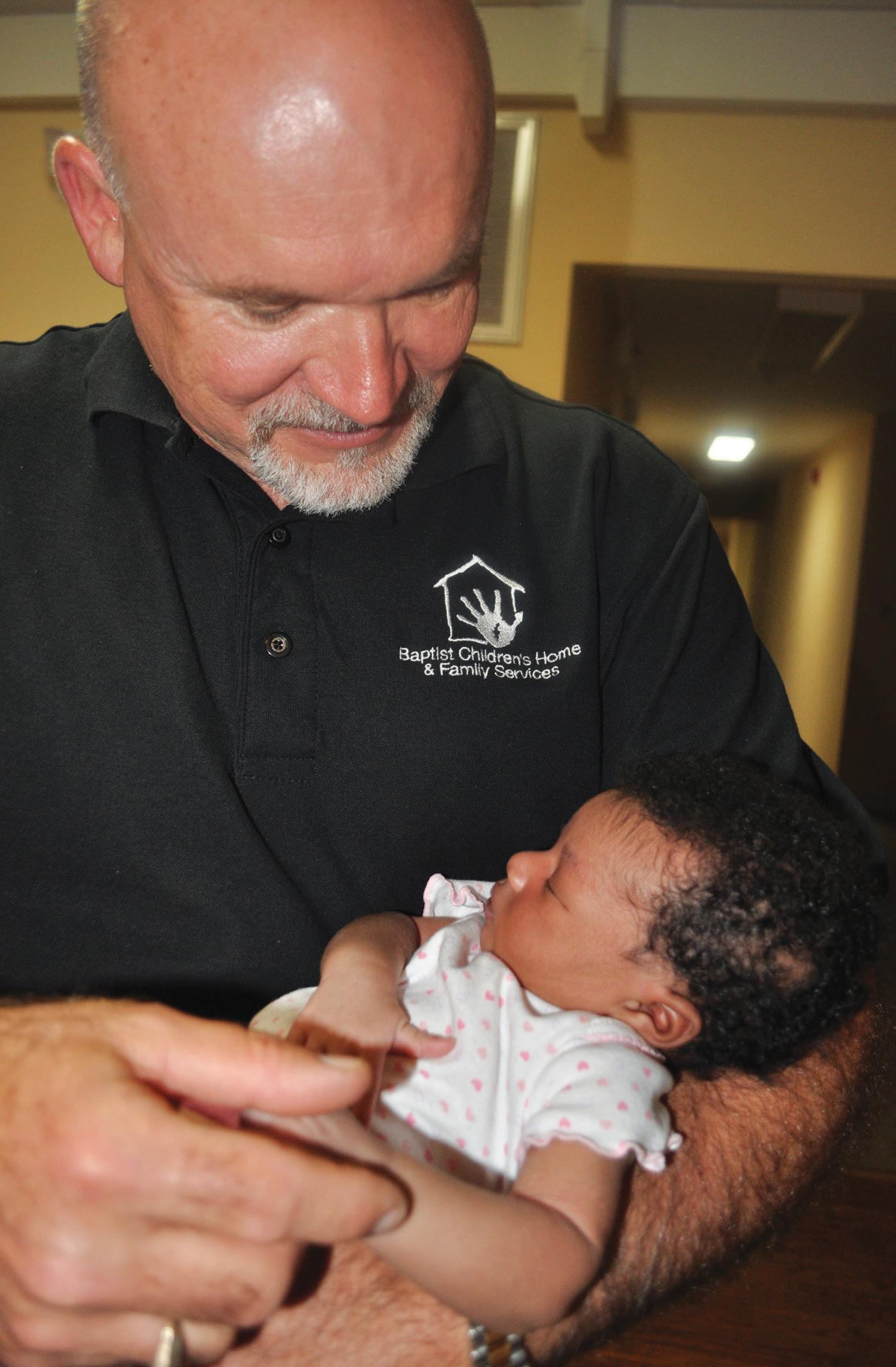
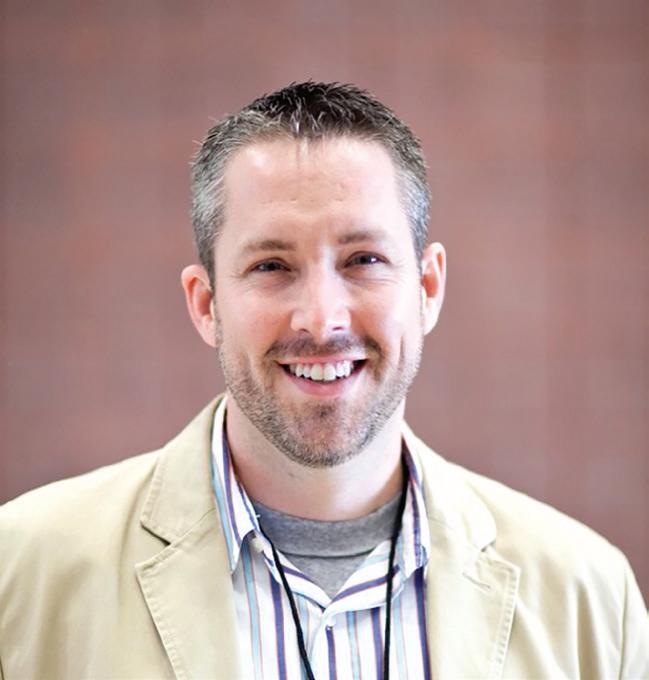
Many tour groups no longer visit Bethlehem, Kugler said, because Israeli tour guides believe the predominantly Muslim area is too dangerous. But the visitors from Illinois were treated by their host family to “enough food to feed literally 20 people,” Kugler said. During a bus trip back to Jerusalem, they also experienced first-hand the security checkpoints so prevalent in the region.
The 2014 IBSA resolution encourages Baptists in Illinois to pray for Christians in Palestine—many who face persecution—and partner







Illinois
Nonprofit Organization U.S. POSTAGE PAID Peoria, Illinois Permit No. 325 What are you waiting for? God has already spoken. Table Talk with J.D. Greear P. 13 Q & A: Retiring Children’s Home leader on legacy and longing P. 7-9 DECEMBER 26, 2016 Vol. 110 No. 18 News journal of the Illinois Baptist State Association Visit our new website IllinoisBaptist.org See page 3 for more addresses.
Baptist
MISSION 10/40 window is moving Mobile population’s impact on gospel connections P. 11 CAMPUS Fast growth Bible study reaches international students P. 10 LEADERSHIP Pat’s Playbook Coaching on sticky issues P. 16
Doug Devore’s 44-year mission to save precious lives P. 3
Tour aims to encourage Leaders take resolution to Middle East Ways to pray in January P. 3 TOP STORIES: What the year just past forecasts for the year ahead P. 5 in focus IB
illinois messengers
NATE ADAMS
CONVENTIONAL WISDOM
Snapshots from the world of Illinois Baptists
“What if we imagined the U.S. as a small town, population 100, instead of a continent-spanning nation with hundreds of millions of people? Doing so…allows us to see basic data about the U.S. and its people in a fresh, simple, and illuminating way.”
– Pew Research
Smaller sample size
Pew researchers used data from their 2014 Religious Landscape Survey to show the religious makeup of the U.S.—if it were a country of 100 people.
Evangelical Protestant (25)
Catholic (21)
Mainline Protestant (15)
Historically Black Protestant (6)
Mormons (2)
Other Christian (2)
Jewish (2)
Muslim (1)
Hindu (1)
Buddhist (1)
Other faiths (2)
Unaffiliated (23)
– Pew Research
the cooperative program

Giving by IBSA churches as of 12/16/16
$5,667,848
Budget Goal: $6,057,693
Received to date in 2015: $5,822,067
2016 Goal: $6.3 Million
The Illinois Baptist staff
Editor - Eric Reed
Graphic Designer - Kris Kell
Contributing Editor - Lisa Sergent
Editorial Contributor - Meredith Flynn
For questions about subscriptions, articles, or upcoming events, contact the Illinois Baptist at (217) 391-3119 or IllinoisBaptist@IBSA.org
The Illinois Baptist is seeking news from IBSA churches. E-mail us at IllinoisBaptist@IBSA.org to tell us about special events and new ministry staff.


POSTMASTER: The Illinois Baptist is owned and published every three weeks by the Illinois Baptist State Association, 3085 Stevenson Drive, Springfield, Illinois 62703-4440. Subscriptions are free to Illinois Baptists. Subscribe online at IBSA.org
Leading in the need of prayer
Especially for leaders, new years require fresh vision. And for Christian leaders, fresh vision requires prayer. But quality prayer takes time and, for me at least, finding that time is one of the biggest challenges I face.
Time is so precious. I often feel I don’t have enough of it simply to do well with my family, my job, my church. So I end up giving almost all my time to those things, and telling myself that God will understand.
He understands, I’m sure. But he can’t be pleased.
It’s been well said that you spell love: T-I-M-E. And since prayer is an expression of my love for God, and I need quality time with God to gain fresh vision for the future and power for daily living, then I must spell prayer the same way. Prayer deserves my time.
I’m convinced I’m not alone in this struggle. Many of today’s well-intentioned pastors and Christian leaders are so pressed for time. And prayer can become one of the earliest casualties of a busy schedule. Yet the shortage of serious time for prayer becomes quickly evident in a leader’s life, and in the fruit of his or her ministry. I know they are in mine.
That’s why I struggled recently when I was asked to bring a devotional word to a national gathering of SBC prayer leaders in Chicago. With some difficulty, I decided to be vulnerable. I admitted to them that I am ashamed of how little I rely on prayer compared to my own efforts. I too rarely engage God in a way that invites him to override my desires or plans. Mostly, I quickly ask him to bless what I’m rushing off to do. I told them I see this happening with Christian leaders everywhere, and that we as leaders need their help reprioritizing prayer in our lives.
Then we looked at Gideon’s experience in Judges 6-7. Like this timid, reluctant, and frustrated leader, we often toil away in our own strength at things that don’t really help much, rather than inviting God into our challenges, and letting him empower our leadership.
But one life-changing day Gideon and God, as “the Angel of the Lord,” had a conversation that has deeply challenged me about my own prayer life. Here’s a summary of what I said about it in my devotion for those prayer leaders:
Gideon was weak when his extended conversation with God began, but God loves to use weak people. Though God initiated the conversation, Gideon did most of the talking, at first. Then, after questions and fleeces, there was a moment of surrender, when Gideon gave his fears, desires, and plans over to God. After that, God did most of the talking, and acting. Gideon never had to say, “God said obey me…” to the people he led. He simply acted with a new boldness that came out of his personal conversation with God. And the people gladly followed him in his obedience to God, with a powerful result that brought God glory and his people victory.
That’s the kind of prayer encounter I need. Gideon was a small man and a reluctant, fearful leader. But all that changed when he engaged God in extended, serious prayer.
In this coming new year, I have concluded that I must do whatever it takes to meet God like that. And I must encourage and facilitate that in the lives of those I lead and influence. I look around me, in Southern Baptist life and elsewhere, and I see that there are others sensing the same need. By God’s grace, a new year gives us more time. Let’s be leaders who give a great deal of that time to God in prayer.
Nate Adams is executive director of the Illinois Baptist State Association. Respond at IllinoisBaptist@IBSA.org.

The shortage of prayer quickly becomes evident in a leader’s life.
2 IBSA. org Illinois Baptist
Continued from page 1
with churches who are supporting them. Kugler and Cruse presented framed copies of the document to several key leaders and pastors.
One such leader, Hanna Atallah, is archbishop for the Greek Orthodox Church in the northern part of the West Bank. “He is a widely respected man in the whole Middle East,” Kugler reported during the trip. “He is a strong advocate against injustice against Christians and promotes peace.”
When Kugler and Cruse met with Atallah to present the resolution, they had a detailed discussion about its purposes and goals, and also talked about future partnership opportunities. “We agreed to jointly work to alleviate the suffering of Christians being discriminated against in Israel and the West Bank,” Kugler said after meeting the well-known leader. “IBSA is becoming widely recognized as a leader in the advancement against discrimination and persecution of Christians in Israel and the West Bank.”
The visitors from Illinois also met with Pastor Bassem Adranly, who pastors a church in the West Bank. “He is a very spiritual man and views the suffering of Christians in the West Bank as a way to bring glory to God,” Kugler said. “He believes Christians in the West Bank will be able to comfort many who are persecuted far more [severely] in Syria.
“He recognizes the injustices, but believes God will be glorified through the suffering and discrimination. He appreciated the resolution and will be sharing it with his church.”
At Alliance Church in Jerusalem, Kugler gave a copy of the resolution to Pastor Mazen Nasrawi, and shared it with the Arabicspeaking congregation.
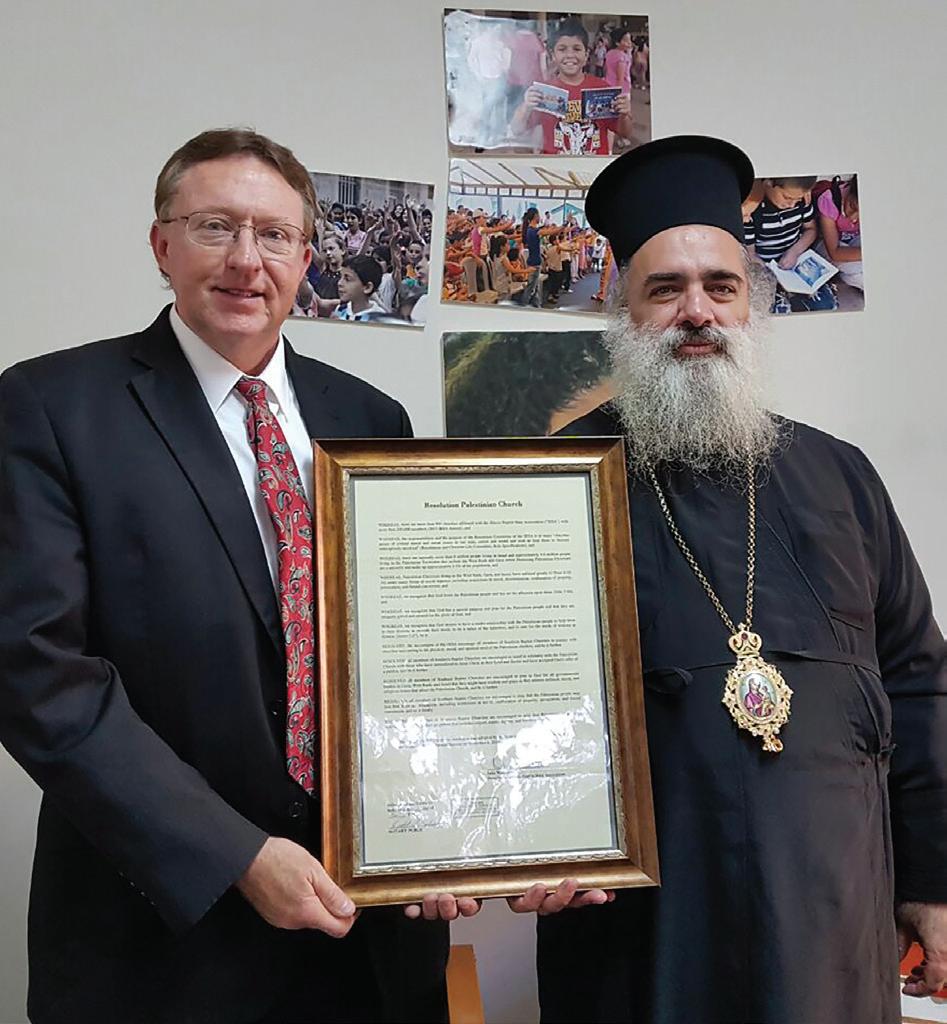
“The hearts of people were visibly touched that IBSA cared about the suffering and discrimination that Christians experience on a daily basis in this area.”
Speaking their language
The trip also offered opportunities to share the gospel and leave behind a gospel resource. “God’s Courtroom” is a one-hour film
Follow

call to prayer
5 Sundays, 5 seasons
SBC emphasis begins in January
Southern Baptist leaders are calling churches to give at least one hour a week to prayer in January. The 2017 Call to Prayer is organized around five specific “seasons” of prayer correlating with the month’s five Sundays.
The emphasis utilizes resources created by PrayerLink, a network of Baptist state and national prayer leaders. Each Sunday, or season of prayer, has an overarching topic:
Season 1: Myself and My Family
Season 2: My Community and Friends
Season 3: My Church Ministries
Season 4: My Country and Its Peoples
Season 5: My World and Its People Groups
SBC CALL TO PRAYER, JANUARY 2017




Kugler produced several years ago that uses history and legal terminology to explain the gospel. The film, which has been broadcast on television in the U.S. and several other countries, was dubbed in Arabic in 2014 by Nashat Filmon, executive director of the Palestinian Bible Society.
While Kugler and Cruse were in the region, “God’s Courtroom” was broadcast on The Way TV, which reaches millions of people in the Middle East. They also shared the film with the leaders they met, and with others who are asking spiritual questions.
A female Muslim professor approached Kugler after hearing him speak at a church in Ramallah. She “was very interested in how I used the law to explain about the gospel,” he said. “She wanted my PowerPoints in Arabic and English. She also wanted a copy of the Arabic DVD.”
Archbishop Atallah, the high-ranking leader they met in the West Bank, also received an Arabic copy of “God’s Courtroom.” Kugler asked for prayer for those he and Cruse met on their trip, including the religious leader. “Pray that God would open his heart.”
SHARED RESOLVE – Hanna Atallah (right) is an archbishop of the Greek Orthodox Church and one recipient of an IBSA resolution Bruce Kugler delivered to several church leaders in the Middle East during a trip in December. –
Within those topics, PrayerLink leaders encourage pray-ers to follow a “10-20-30” model: 10 minutes of Scripture reading, public leadership, and worship; 20 minutes of sharing prayer concerns related to the focus area in small groups; and 30 minutes of guided individual, group, and corporate prayer.
DURING THE MONTH OF JANUARY, SET ASIDE AT LEAST ONE HOUR FOR FOCUSED PRAYER USING THE 10-20-30 PRAYER MODEL.
In October, PrayerLink hosted a prayer gathering based on the 10-20-30 model and five seasons of prayer at Broadview Missionary Baptist Church.
The theme of the 2017 Southern Baptist Convention also is focused on prayer, SBC President Steve Gaines announced this month. “I am convinced prayer should be the number one priority for every Christian,” he told SBC Life. The pastor of Bellevue Baptist Church in Memphis, Tenn., continued, “Talking with and listening to God as we read his Word are the most important things we do. Without these disciplines, we cut off the flow of the Holy Spirit’s power. We cut him off from speaking to our hearts and giving us direction.
“The Southern Baptist Convention needs to be a people of prayer. Only then will God send the power we need to fulfill the Great Commission.”
Churches can access resources for the Call to Prayer at sbc.net/inallthingspray.

The Ticker
twitter.com/illinoisBaptist
vimeo.com/IBSA IBSA.org www.ib2news.org
the latest Illinois Baptist news NEWS
facebook.com/illinoisBaptist
pinterest.com/illinoisBaptist
IBSA. org 3 December 26, 2016 IllinoisBaptist.org
IB ACTS
PRAYER FOCUS But you 1 will receive power when the Holy Spirit has come on you, and you will be My witnesses in Jerusalem 2, in all Judea 3 and Samaria 4, and to the ends of the earth 5 (Acts 1:8). JANUARY 1 Ask the Lord to make you a willing volunteer to tell others about Jesus. Create a prayer list of your family members, praying for them daily. Ask members of your congregation to write down names of unchurched and lost family members on a note card and bring them to the front of the worship center and place them before the Lord. As they bow in prayer, have a church member pray for the salvation of these family members. JANUARY 8 Introduce the CrossRoads Prayer Evangelism ministry (see sample at InAllThingsPray.net). Encourage church members to list names of up to five friends and begin tracking their prayer, care, and sharing with those friends. Solicit names in Sunday school classes. Covenant to pray as a group for the salvation of those named. Encourage small groups in your church to “adopt” your community’s first responders and school teachers for regular prayer. JANUARY 15 Print the names and dates of the church’s planned evangelistic emphases for the next six months—things like VBS, revival services, or special music programs. Lead the church to pray for these planned events by name during the pastoral prayer time on Sunday morning. Pray also for the continued health and unity of the church. Pray by name for the church’s ministry teams and committees, encouraging volunteers to use their ministry opportunities to expand the Kingdom. JANUARY 22 Read 1 Timothy 2:1–6 aloud during the morning worship service. Ask the congregation to intercede for the nation. Mention the names of elected officials during the pastoral prayer. Pray for the Lord to multiply your church’s reach by calling out of your congregation those who will serve as pastors and church planters. Pray for the diverse peoples of our nation and for the racial reconciliation that is possible only through salvation in Jesus Christ. JANUARY 29 During the pastoral prayer, pray for those in your church who may be sensing God’s call to become part of the “limitless ministry teams” serving alongside our IMB field missionaries. Ask the Lord to give IMB trustees and leaders divine wisdom and guidance as they challenge Southern Baptists to be on mission with God. Ask for wisdom and mercy for missionaries accepting often-dangerous opportunities for service around the world.
1:8
1 MYSELF AND MY FAMILY 2 MY COMMUNITY AND FRIENDS 3 MY CHURCH MINISTRIES 4 MY COUNTRY AND ITS PEOPLES 5 MY WORLD AND ITS PEOPLE GROUPS *For a description of the “10-20-30” prayer model and for other resources visit InAllThingsPray.net.
*
From SBC Life reports
From the front: resolution on tour
Defending Chip & Jo
A Nov. 29
BuzzFeed piece on Chip and Joanna Gaines called out the TV stars for going to a Waco, Texas, church where the pastor opposes samesex marriage.

The couple, known for their popular HGTV show “Fixer Upper,” received support from an unlikely source—a writer who is currently planning his own same-sex wedding.
“BuzzFeed can’t argue that the same-sexmarriage issue is ethically settled, because it isn’t for a sizable population of our country and our world,” Brandon Ambrosino wrote for The Washington Post. “It is no longer okay—indeed, it never was—to write cutesy articles shaming religious people as homophobic for simply being one of the many millions of Americans in 2016 who attend a religious congregation that does not support same-sex marriage.”
‘We will never forget’
The U.S. House of Representatives voted unanimously Dec. 8 to approve a bill that would require the U.S. secretaries of state and defense to develop a five-year plan to combat Islamic terror group Boko Haram.
“I urge the president to immediately sign this bill into law and send an international signal that we will never forget the girls of Nigeria who were targeted simply because they chose to pursue an education,” said Sen. Susan Collins (R-Maine), one of the bill’s sponsors.
In their campaign against Western education, Boko Haram kidnapped more than 300 girls in April 2014 from their school in Nigeria. Many are still missing.
And the winner is…
PANTONE, the company known for identifying countless shades of digital color, has named “Greenery” its color of the year for 2017. The annual title goes to a color that offers a “snapshot of what we see taking place in our global culture,” the company said on its website.

“Greenery bursts forth in 2017 to provide us with the reassurance we yearn for amid a tumultuous social and political environment,” said Pantone Color Institute Executive Director Leatrice Eiseman
– The Washington Post, WORLD, PANTONE
Get breaking news in The Briefing online, posted every Tuesday at www.ib2news.org.
Busy season for Baptist women
Spend time with Jesus, Munton urges ministers’ wives
Broadview | IBSA ministers’ wives held their annual conference and luncheon Nov. 2 during the IBSA Annual Meeting, where they talked about what it means to share “the aroma of Christ.”


The Christmas-themed gathering featured Vickie Munton, a pastor’s wife from First Baptist Church in O’Fallon, who encouraged the women to pay close attention to their own spiritual lives.
“You have to spend time with Jesus if you want to have his aroma, if you want to absorb some of what he’s like into your life,” Munton said.
She shared the luncheon’s theme Scripture passage, 2 Corinthians 2:1416, which says Christ is the one who uses his people to spread the aroma of the gospel to people who don’t know
him. “Apart from Christ, I know I can do nothing,” Munton said. “When I read these verses, I’m encouraged because I know it’s not about me.”
Lindsay McDonald, a pastor’s wife from First Baptist Church, Casey, and president of this year’s luncheon, said women at the luncheon also participated in small group discussions on each of the three areas Munton addressed: home, church, and community.
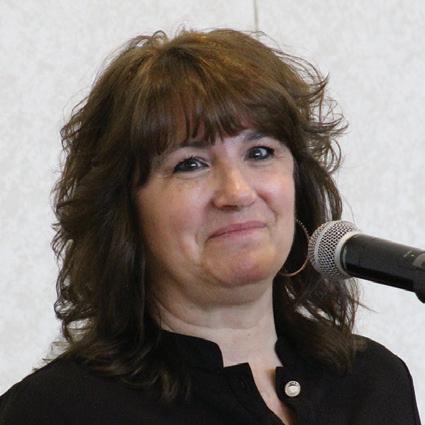
Those in attendance also elected officers for the 2017 luncheon. Gail Faulkner of First Baptist Church, Bethalto, will serve as president; Jennifer Carrothers of Rochester First Baptist Church is vice president; and Terry Kenney of First Southern Baptist Church, Beardstown, is treasurer.
Students have AWSOM weekend
Springfield | More than 200 teen girls and their leaders attended the 2016 AWSOM conference at IBSA Nov. 5.
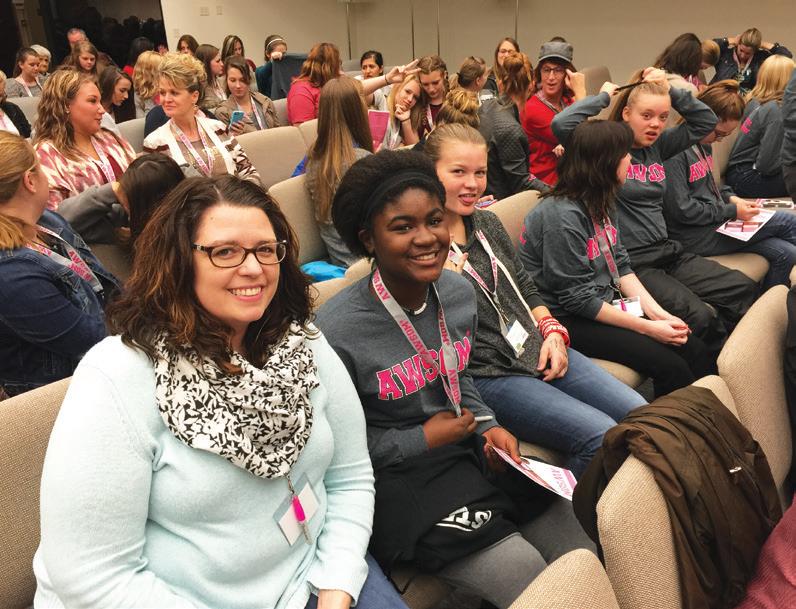
“AWSOM (short for “Amazing Women Serving Our Maker”) is a weekend designed for girls equipping them for peer-topeer evangelism and missions education,” said Carmen Halsey, IBSA’s director of women’s ministry and missions.
The event also allows churches with smaller youth groups to join other students for encouragement, fellowship, collective worship, and discipleship, Halsey said.
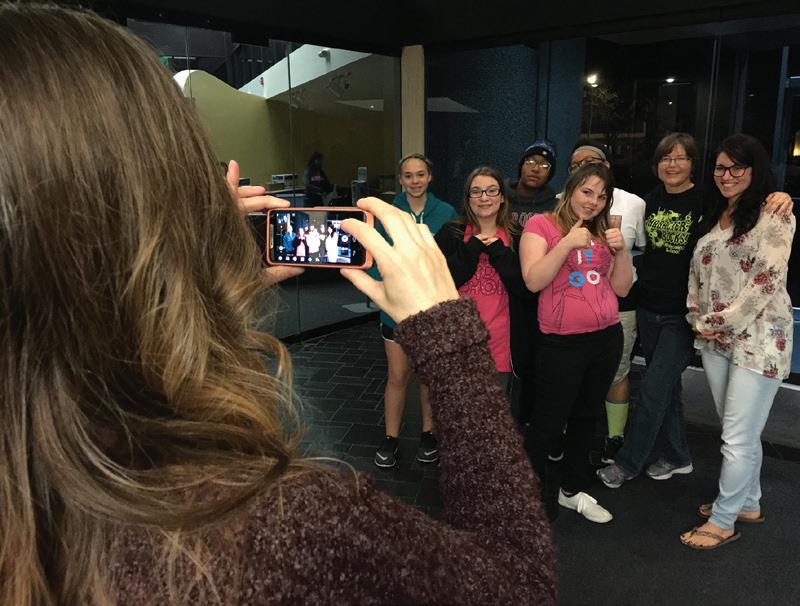
Paula Marsteller of Revive Our Hearts, the ministry of author and radio host Nancy DeMoss Wolgemuth, was the featured speaker for AWSOM, which also included a variety of breakout sessions.
Halsey said one parent had already reached out to say that her daughter had used what she learned at AWSOM to help a friend who was struggling.
For more information about AWSOM and other opportunities for students, go to IBSA.org/students.
4 IBSA. org Illinois Baptist
SHARING IDEAS – Sitting around tables at Broadview Missionary Baptist Church, women at the IBSA ministers’ wives conference discussed what it means to express Christ through their various spheres of influence.
MUNTON
the briefing
Cloudy with a chance of surprises
live by God’s surprises,” said Helmut Thielicke. The German pastor was speaking in times more trying than ours, but in the darkest days of WW2, he could see the hand of God at work—and was amazed by it.
Dare we say the same of the year just past?
We were surprised by events we witnessed. In their unfolding, we sought the reassurance of God’s sovereignty. Here are some noteworthy moments for Baptists in Illinois—some heavy, some light—and what they may say about the year before us.
– The Editors
Standing on the promises
A third of Americans (34%) think Donald Trump will be a “good” or “very good” president, while 23% say “average” and 36% expect a “poor” performance. The survey by CBS News was conducted the second week of December, after Trump began announcing cabinet appointments.
The ratings fall along party lines: 70% of Republicans expect a good presidency, while 60% of Democrats predict poor results. That means evangelicals, who mostly supported Trump, have high expectations—but for what?
Religion reporter Sarah Pulliam Bailey, on her Washington Post blog, points to a half-dozen areas where Trump’s campaign promises intersect with evangelical interests. Some are the expected areas involving religious liberty. The nomination of Supreme Court justices who will uphold prolife legislation topped the list. Trump also said he would defund Planned Parenthood, sign a bill that forbids abortions after 20 weeks, and make the Hyde Amendment permanent. It prohibits use of federal funds for most abortions. And Trump has expressed support for a group of nuns who have battled provisions in the Obama Affordable Care Act that mandate contraception as part of an organization’s health care plan. Southern Baptists have supported their lawsuit.

Trump promised to repeal the 1954 Johnson Amendment to the U.S. tax code, which prevents pastors from endorsing or opposing political candidates, or else lose their church’s tax exempt status. And he has taken a position on education funding that allows families to choose private, charter, or home schooling, with a promise to set aside $20 billion for vouchers in his first budget.
The U.S. will be a “true friend to Israel,” Trump said, a position common among evangelicals favoring Israeli interests over others in the Middle East and urging movement of the U.S. embassy to Jerusalem.
Many Southern Baptists would support these actions, if they came to pass. For SBC leaders who have been in contact with the future administration, the Trump presiden-
cy represents a new way of thinking about the White House. Since Ronald Reagan’s presidency, Southern Baptists in general have viewed Republican administrations as allies in the causes of pro-life, families and marriage, and religious liberty. They have, at the least, been sympathetic to evangelical causes, and even co-laborers in the faith. (Remember the stories of George and Laura Bush singing hymns at the White House piano with Attorney General John Ashcroft and Secretary of State Condoleezza Rice on the keyboard?) Democratic presidents, on the other hand, have often been at odds with evangelicals’ causes, even if they claimed to be Baptists, as in the case of Bill Clinton.
Donald Trump represents a third way of relating to the White House: a president who made promises to evangelicals and drew their support at the polls, but who shares no apparent faith commitment with the born-again community. (There are no stories of Trump walking on the beach with Billy Graham and committing his life to Christ. And the tycoon-turned-president has said he sees no need to ask for forgiveness for his sins.)
The evangelicals closest to Trump, including incoming vice president Mike Pence, take on the role of Joseph in Egypt—keeping the interests of God’s people before pharaoh, hoping to keep his ear and hold him to his promises.

High hopes for high court
Some voters who cast their ballots for Donald Trump said they did so because of concern for the U.S. Supreme Court. The February death of Justice Antonin Scalia left a vacancy, and three of the Justices—Ruth Bader Ginsburg, 83, Anthony M. Kennedy, 80, Stephen G. Breyer, 78—may be looking toward retirement in the next few years.
Focus on the Family founder Dr. James Dobson supported Trump. He told Christianity Today, “The next president will nominate perhaps three or more justices whose judicial philosophy will shape our country for generations to come.”
A LifeWay Research survey found 23% of evangelical pastors were most concerned about the candidates’ likely Supreme Court nominees. And 36% of Trump-supporting pastors cited the high court as a major factor in their choice.
Trump released a list of his potential Supreme Court nominees—20 judges and one senator, Mike Lee of Utah. Each met two criteria: they are pro-life and support the Second Amendment. The list was vetted and reviewed by the Federalist Society, which is comprised of conservative and libertarian lawyers, and the conservative Heritage Foundation.
Commentator Denny Burk told Baptist Press the list “does not alleviate the concerns that many of us have about his candidacy.” Because Trump didn’t promise to pick someone from the list, Burk said, “The list means nothing....And we are again being asked to trust the judgment of a man who changes his positions daily…” Burk is professor of biblical studies at Boyce College, the undergraduate school of Southern Seminary.
Reince Priebus, future White House Chief of Staff, told radio host Hugh Hewitt on December 14 that the President-Elect will likely name Scalia’s replacement near the January 20 inauguration.
Priebus said Trump may choose a younger nominee. “Well, I tend to believe younger is better, too, but I can tell you what the president (elect) believes is that the most qualified, best person to serve on the Supreme Court is what’s most important....Certainly longevity’s a factor, but it’s just a factor. Competence and having the best possible person nominated is what’s most important.”
IBSA. org 5 December 26, 2016
2017 forecast “We
Tension between leaders, pews
The 2016 presidential campaign and election exposed deeper divides than many knew existed in the U.S.—and within evangelicalism. White evangelical voters overwhelmingly supported Trump, even while some of their leaders voiced their opposition.
As Wheaton College’s Ed Stetzer said after the election, “The evangelical leadership is out of touch with the evangelical rank-and-file,” during a Christianity Today podcast.
Tension over the election appears to be at least part of a rift between some Baptists and the SBC’s public policy entity, the Ethics and Religious Liberty Commission.
In November, Louisiana Baptists voted to ask their convention’s executive board to study recent actions of the ERLC.
Will Hall, editor of the state’s Baptist Message newspaper, noted that the motion did not elaborate on the issues of concern, “but ERLC President Russell Moore has come under fire nationally from Southern Baptist laymen and leaders for a number of controversial actions and statements, including… his aggressive attacks on Southern Baptists who supported Donald Trump.”
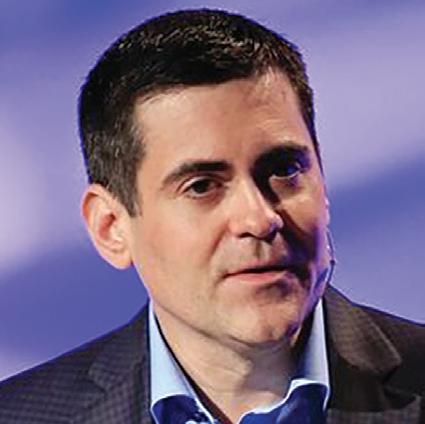
Moore, who has led the ERLC since 2013, wrote an opinion piece for The New York Times in May in which he said the election “has cast light on the darkness of pent-up nativism and bigotry all over the country.” His article caught the attention of Trump, who tweeted that Moore was a “truly a terrible representative of evangelicals.”
The op-ed also sparked a fervent debate on the SBC Voices blog, where Baptists posted a variety of opinions on Moore, from “he did what we pay him to do,” to “it is difficult for me to imagine Russell Moore functioning as ERLC President if Trump wins in November.”
The questions about Moore and the ERLC are just one example of the impact the 2016 election could have on religious organizations and denominations, and on the nature of Christian leadership. The tension leaders face, Ed Stetzer said, is between recognizing the responsibility to speak prophetically, and realizing they represent a constituency who largely feel very differently than they do.
For Christian leaders, their influence in the next four years may well depend on how well they strike the balance.
Miracles still happen!
Cubs fans wanna know, Can it happen again?

It took 108 years to repeat, but the Chicago Cubs won the World Series. Even though the deciding game was played in Cleveland, it was great to be in the Windy City to join in the high-fives. The win was on the same night as IBSA’s big “Mission Illinois: Cross Culture” presentation and Doug Devore’s retirement reception—but most folks made it to a screen somewhere to share the victory. Thanks, Cubs, for making Illinois Baptists’ trip to Chicago extra memorable.
SBC candidates: Unity matters
What the U.S. presidential election may have lacked in civility, the 2016 election for Southern Baptist Convention President more than made up for in grace. When a close vote forced a run-off between Steve Gaines and J.D. Greear, the election seemed poised to divide Baptists over matters of theology and generation.
Instead, the candidates talked the night before the third vote was to be taken, and one bowed out, urging his supporters to vote for his opponent.
“It’s time for us to step up and get involved, to keep pushing forward and engaging in the mission with those who have gone before us,” North Carolina pastor Greear posted in support of Tennessee pastor Gaines. “It’s time to look at what unites us.”
On paper, this decade’s SBC presidents are a diverse bunch, not united by much in terms of their backgrounds and interests:
Atlanta-area pastor Bryant Wright (2010-2012), who recently spoke out in favor of ministering to refugees
Dynamic New Orleans preacher Fred Luter (2012-2014), elected as the SBC’s first ever African American president
Ronnie Floyd (2014-2016), pastor of a multi-site church in Arkansas and a prolific blogger who led the denomination toward a laser-like focus on prayer
And Gaines, elected in 2016, who has espoused traditional Baptist theology and his own intense focus on evangelism.
What does unite them is a logical progression in the things they have called Baptists toward: For Wright, it was a return to Great Commission principles. Luter’s presidency was marked by impassioned pleas for spiritual awakening and revival. And Floyd called Southern Baptists to their knees—for themselves, their churches, the denomination, the nation, and the world.
Gaines announced he will continue the emphasis on prayer at the 2017 Southern Baptist Convention in Phoenix. It may be a sign that the desire for unity, despite differences in age, theological perspective, and communication style, is actually, in Greear’s words, “what unites us.”
If I had a hammer
We’ll hear it a lot in the new year. On Halloween night in 1517, disgruntled priest Martin Luther nailed his 95 complaints on the church door in Wittenberg and started an ecclesial revolution. We’re likely to hear about it from all corners, including events at our seminaries, panels at the Southern Baptist Convention in Phoenix, and bus tours of Germany. And we may have a few serious discussions about the theological direction of the SBC. Look for Reformation@500 in the pages of the Illinois Baptist throughout 2017

A new missions paradigm
After a season in which budget shortfalls and personnel cuts seemed to limit the future potential for Baptist missions engagement around the world, International Mission Board President David Platt continued to preach a message to the contrary.
“Limitless” is the word Platt has used to describe the mission force needed to take the gospel to places without it. To achieve that goal, he has said, the SBC has to think differently about missions and missionaries than we have in the past.
“Let me be crystal clear: the IMB is still going to send full-time, fully-funded career missionaries just like we’ve always sent,” Platt said during his report at the 2016 Southern Baptist Convention in St. Louis. “They are the priceless, precious, critical core of our mission force.”
But the IMB’s emerging strategy is to put around those missionaries a “limitless” force of students, retirees, and professionals—people who, to borrow Platt’s words, are willing to leverage their jobs and lives so that more might hear and respond to the gospel.
The newly redesigned IMB website reflects the strategy, with buttons for people in a variety of categories to search for opportunities overseas. There are needs for business consultants, healthcare professionals, construction engineers, and more. The IMB also offers training resources for churches to equip and mobilize members for missions, both shortterm and longer.
Global mission “is not just for a select few people in the church, but for multitudes of Spirit-filled men and women across the church,” Platt said in St. Louis.
A year ago, when hundreds of IMB missionaries moved back home, the chances of getting the gospel to some of the world’s darkest places seemed dimmer. Now, with a strategy focused on everyday people like the ones who sparked a gospel fire in the New Testament, the opportunities seem endless. Or, limitless.
Totalprosports.com 6 IBSA. org Illinois Baptist
MOORE
IN FOCUS
Family man
After 44 years at BCHFS, Devore leaves legacy of love and progress
Carmi | Doug Devore didn’t grow up in a Christian home.
“I never knew my father, and I had three stepfathers,” Devore told the Illinois Baptist. Maybe that’s why family is so important to the long-time executive director of Illinois Baptist Children’s Home and Family Services. Devore will retire January 15 after nearly 44 years at the agency, including 21 years as executive director.
BCHFS has four residential cottages for children and teens in Carmi, and also operates Angels’ Cove Maternity Center in Mt. Vernon for expectant and new moms and their children. The agency has 11 counseling centers around central and southern Illinois, assists with adoptions, and partners with an orphanage in Uganda, among other initiatives.
The IB recently sat down with Devore to talk about his extensive ministry, the challenges of ministering to families in a shifting culture, and the success stories of children who have benefited from the care they received through BCHFS.
Illinois Baptist: Tell us how you got your start at BCHFS.
Doug Devore: I was working at Campbell Funeral Home here in Carmi. Gordon Lanthrup, who was the director of residential care at the Children’s Home, was there at the funeral home one day, and he just started to talk to me. He asked me if I would do some volunteer work at Baptist Children’s Home. I didn’t know it even existed.
Continued on page 8
Doug Devore is photographed with every baby born at Angels’ Cove Maternity Center in Mt. Vernon. The ministry, an arm of Baptist Children’s Home and Family Services, exists to prepare expectant moms and to provide needed resources for new parents.
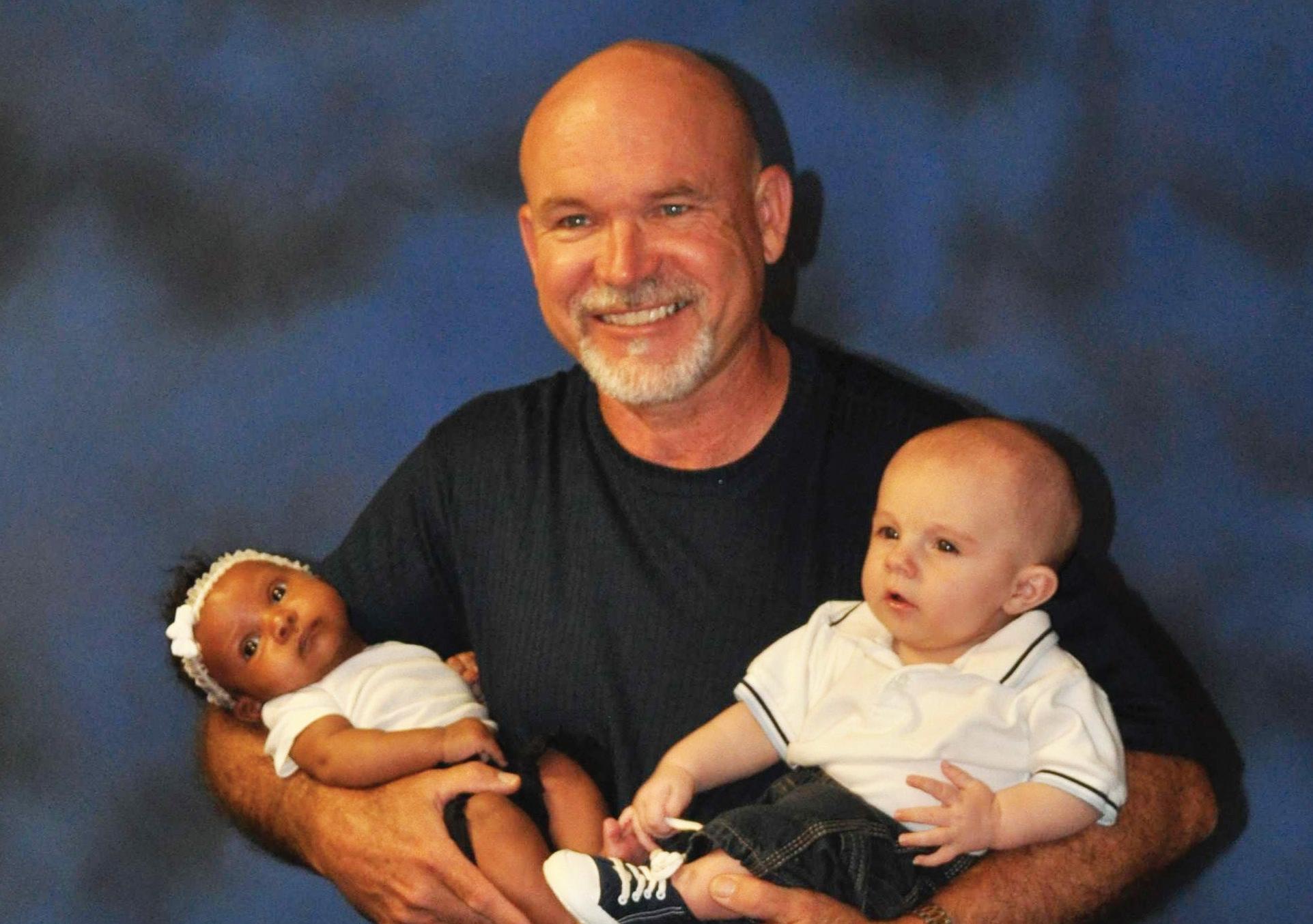
IBSA. org 7 December 26, 2016
Q&A BY LISA SERGENT
PHOTO: BABY’S FIRST PHOTO SHOOT
Continued from page 7
I came out here and I met the kids and staff and I just fell in love with the place. God began to say, This is what I want for you. It makes me very emotional now to talk about something that happened 44 years ago, but it just began to click with me that there was a place for me to minister here and to be involved.
Illinois Baptist: When you retire January 15, your tenure at BCHFS will be just shy of 44 years. Wow.
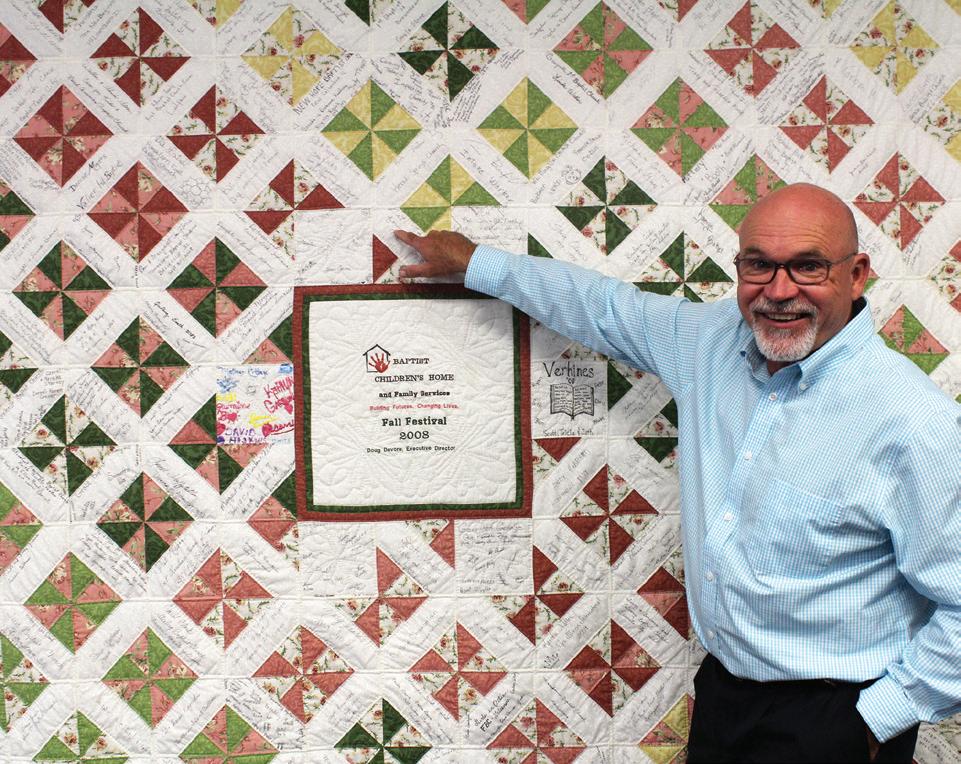
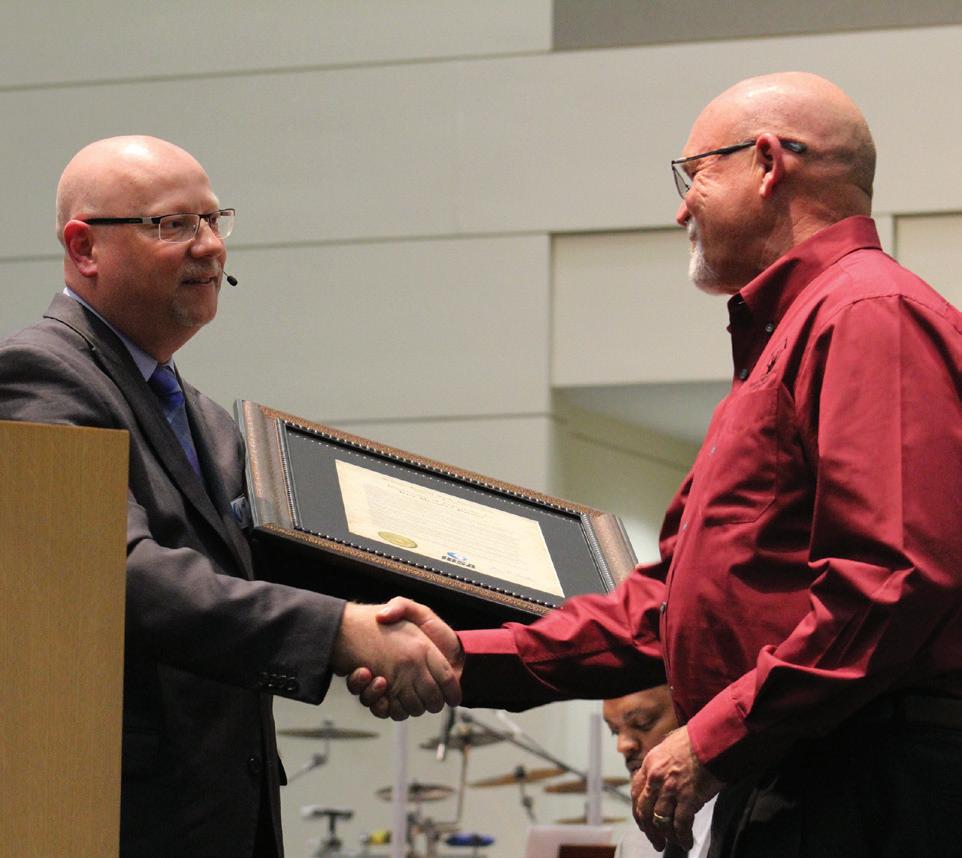
Devore: I owe a lot to Gordon Lanthrup and (former BCHFS Executive Director) Leon Tally. To Gordon who saw something in me as a 21- or 22-year-old that I didn’t know was there. Why he ever asked me to do that is a mystery.
IB: It was a God thing. Devore: I can’t explain it any other way. I always question, Why me?
IB: When you consider all that you have done and seen in your four decades at BCFHS, what touches your heart or brings a tear to your eye?
Devore: Well, you can see that I cry a lot, and the older I get, the more I cry. (Devore shared an e-mail he received the day before from a young man who lived at the Children’s Home in 1982. He wrote, “I just wanted to say thank you again for being part of my life and helping me grow physically and mentally and emotionally and most of all SPIRITUALLY.” )
He now sings in a gospel quartet and travels the country; married and a faithful Christian, and sends me a little note like that. You can’t beat that.
IB: You can’t.
Devore: There was another man who is now 57 or maybe older. He has been in and out of prison all his life. But he calls me at least every six months to check in. Sometimes he is calling from prison or he’s out on parole. He calls me just to check in and let me know that he loves me and how he is doing. I try to give him my best advice while we are on the phone, but we are his connection, his touchstone. We are his family and I have been here long enough that I’m the only one around that was here when he was.
IB: Even with so many wonderful stories from your years at BCHFS, there have been challenges. What are some of the biggest?
Devore: The kids I saw in the 70s were coming out of situations when mom and dad couldn’t take care of them, so they ended up with us. They couldn’t take care of them because one parent died, or maybe they were orphans. Not so much behavior issues.
The kids today are coming to us because they are out of control and mom and dad can’t take care of them. Schools have thrown up their hands. We see kids today that have a lot more trauma in their lives.
IB: What about shifts in our culture? How have those affected BCHFS?
Devore: Most of the children we serve are growing up in single-parent families because the concept of marriage and staying together has changed over the years. Or, they’re growing up in blended families. With that comes lots of stress. There’s nothing wrong with a blended family, but it brings additional stress to kids than if mom and dad had stayed married and had a happy relationship.
A lot of our kids have been exposed to violence, abused and traumatized, and have post-traumatic stress disorder issues. We see kids coming out of inner cities that have gang involvement. They have seen people killed in front of them. They have had family members killed. It’s a bad situation for them. They are exposed to things that even I wasn’t exposed to in my wild upbringing.
IB: The concept of “residential care” has changed too.
Devore: Very few kids come here and grow up. Our average length of stay is eight months, something like that. When I came, there were kids who had been here for years. This was home for them. It happens a few times today, but generally, if that happens, we move those kids into foster care. If they don’t have a home to go back to, we are looking for them a more permanent situation.
IB: The need for residential facilities has changed in recent years because of expansion of the foster care system.
Devore: Residential care for kids is not a preferred placement today. There is federal legislation preferring foster care over residential care because some think being in residential care is a bad thing. I don’t think so. I think this is a great place for every kid that’s here. When it becomes not the most appropriate, then we will either move them back home or into foster care or some less restrictive care.
That’s always one of our issues: How do we stay relevant to the needs of society? How do we stay relevant now with the changing values? I guess on top of that, how do we stay relevant and still operate within our own values, without sacrificing what we believe in?
IB: What do you think about the movement urging Christians to become foster parents through the state system?
Devore: I think that is excellent. If kids are going to live in foster care, my goodness, let them live in a Christian foster home. I think that is a tremendous idea and I would love to see more Christian families get involved in that.
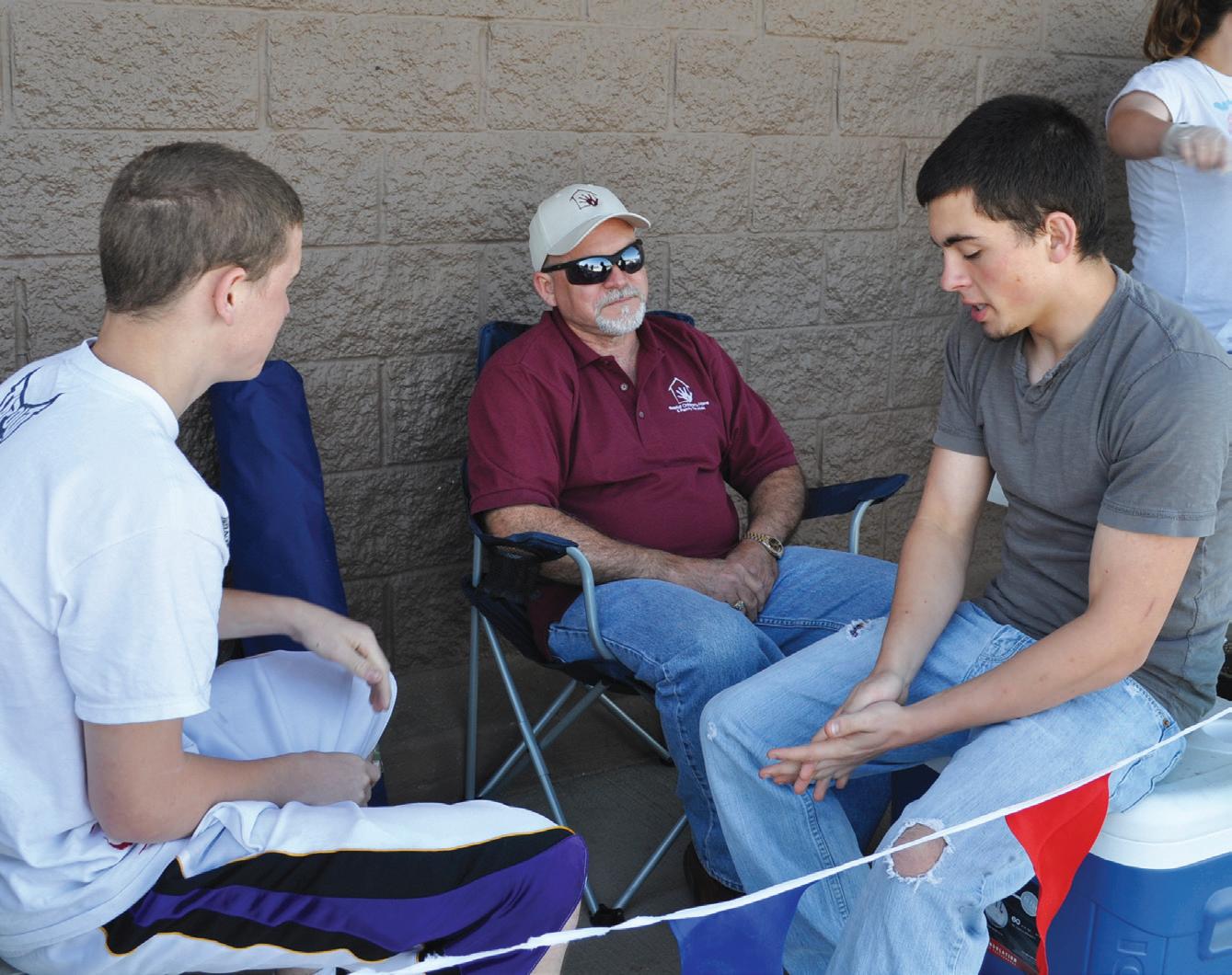
8 IBSA. org Illinois Baptist
GUY TALK – Devore, center, makes a point of maintaining relationships with residents. “Taking kids hunting, fishing, whatever I can do to get involved in their life,” he shared. “I have to be very purposeful about doing that because I’m not working with them on a day-to-day basis. I get to do a lot of good things with them.”
PATCHWORK FESTIVAL – A quilt hangs at the administration office in Carmi. The quilt was donated to the annual Fall Festival fundraiser in 2009, and purchased by a group of staff. Blocks of the quilt were signed by staff members, retirees, residents, and festival-goers in appreciation of Devore and the work of BCHFS.
HONORED – Doug Devore was honored ahead of his retirement at the 2016 IBSA Annual Meeting. IBSA President Kevin Carrothers cited Devore for “exceptional leadership and faithful service.”
IB: You became executive director at BCHFS in 1995. Did you set any goals for yourself?
Devore: The first thing I did when I became the executive director is that we did strategic planning for the agency. In that first strategic plan, one of the biggest things was to get our own board of trustees. The other big part was to hire a development person.
We worked through those goals and in 1999 we did another strategic plan. Every three years since that time, we have done another strategic plan. We have looked ahead to the future: Where do we want to be? How do we want to get there? How do we better minister to children and families? All that has happened—whether it be the international ministry or the Pathways Counseling ministry or the expansion of Angels’ Cove—has come out of those strategic plans.
IB: Are there things you planned to do that haven’t happened?
Devore: Yes. We didn’t become an international placing agency for adoption. It was very frustrating for me for quite a long time until it finally just sunk in that this just wasn’t what God wanted us to do. I think it was what Doug Devore wanted to do.
We talked about trying to have an on-ground school for some of our kids that have a difficult time making it in the public school, but there has always been something that prevented that from happening.
IB: As a leader, what has been your most dificult task?
Devore: How we find the resources to do what we need to do. I don’t want to say it’s about the money, but that’s been a challenge. When I became the director, our budget was $1 million and we were serving 160 children and adults. Today, our budget is approximately $2 million and we are serving over 1,300. The ministry has grown and developed, and the challenge has been how to find the resources to serve more people and how to develop programs to serve more people.
IB: You and your staff experience a lot of things most people don’t. What do you think to yourself when you see a young mom holding a baby she chose not to abort?
Devore: What a joy to see that baby born. To know that baby could have been aborted and not be here. To see that young mother hold that child and be happy they have made this decision to choose life. What a great thing that is, and now it is our responsibility to enable that mother to be the best mother that she can. Whether she is 12 or 40, she may not be prepared for that child. We have the responsibility to help get her prepared and to help her be the very best mother that she can be.
IB: What about those who choose adoption?
Devore: It’s hard to see any mother give up her child for adoption. Often it is the very best decision they can make and I admire their courage to make that decision. But it breaks your heart to see the pain they go through. Then you see the family who is taking that child, and you see the delight in their eyes that their dream has now come true. What a blessing.
IB: Does a specific story come to mind, something you’ve seen God do recently through BCHFS?
Devore: We had a 15-year-old girl come to our maternity center who had been adopted from Guatemala. She was pregnant and had decided to
keep her baby. Her parents placed her at Angels’ Cove and said she and the baby couldn’t come back to live with them.
We just began to pray for her and Carla (Donoho, Angels’ Cove director) shared in a WMU meeting over at Woodlawn about this girl and that we were praying for a family for her. Carla finishes speaking, and a woman comes up and says, “I think my husband and I can take her.”
Really?! God does so many amazing things. The woman, who’s one of our board members, goes home and tells her husband. He says, “I don’t know why we couldn’t.” They had already adopted two kids. So they took the mother and her baby, and since then, they have officially adopted the mom.
IB: That’s an amazing story.
Devore: It was just miraculous. How does God find a family? It’s amazing. There have been hundreds and hundreds of those types of stories where God has worked in the lives of people, kids, and families, and made a difference. It has been very rewarding.
IB: What does the future of Baptist ministry to kids and their families look like, especially in Chicago where the need is so great but Southern Baptist presence is relatively small?
Devore: Baptist Children’s Home needs a presence in northern Illinois. We’ve just not had the resources to be able to do it and to make it work. We tried
in 1999 when we opened a Pathways Counseling office but had to close it because it wasn’t financially feasible. I think the future for us would be that we would get a Pathways Counseling office open again in northern Illinois and to be able to provide Christian counseling.
We serve a lot of kids from that area and a lot of young mothers, but still we are out of sight, out of mind. We need a greater presence, a greater awareness of the ministry of the Children’s Home in northern Illinois.

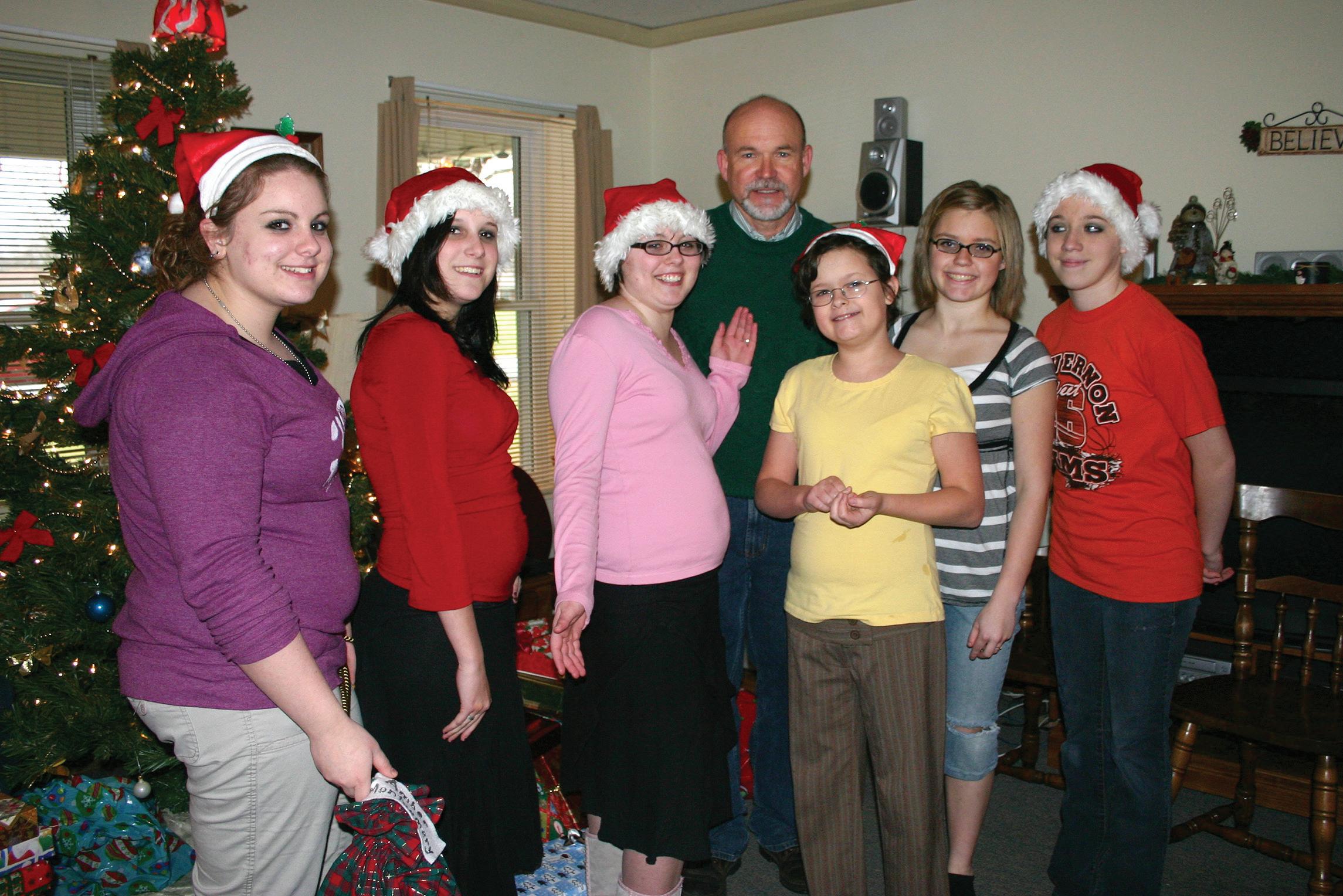
IB: What advice would you give to Denny Hydrick as he takes over the executive director role at BCHFS?
Devore: The ministry faces many challenges in the coming years: competition for philanthropic dollars, managed care uncertainties, staff shortages, changing values regarding marriage, family and group care, and more complex behavior and mental health issues.
Denny Hydrick comes with great experience from working in child care agencies in both Mississippi and Florida. He understands the issues we are facing and I’m confident that he will provide the needed leadership for the days ahead. My advice to him is to trust God, who has maintained this ministry for 98 years, and to trust the people who work here. They have proven their faithfulness to children and families over and over.”
IBSA. org 9 December 26, 2016
ENCOURAGING MATERNAL INSTINCTS – The young women at Angels’ Cove Maternity Center chose life over abortion. “We have the responsibility to help get her prepared and to help her be the very best mother that she can be,” Devore said.
“What a joy…to see that baby born...to know that baby could have been aborted and not be here. To see that young mother hold that child and be happy they have made this decision to choose life.”
– Doug Devore
campus ministry
Ohio limits abortions
Governor John Kasich signed a bill into law Dec. 13 that will prevent abortions in Ohio after 20 weeks’ gestation. He also vetoed a “heartbeat bill” that would ban abortions as soon as a fetal heartbeat is detected, which can be as early as six weeks’ gestation.
“Similar legislation enacted in two other states has twice been declared unconstitutional by federal judges, and the Supreme Court declined to review those decisions,” Kasich said in vetoing the bill. His veto is “in the public interest,” the governor said, because Ohio taxpayers would be forced to fund a lawsuit in which their state would be the losing party.

Even the 20-week ban could still be contested, USA Today reported, because the Supreme Court currently says abortions cannot be banned prior to 24 weeks’ gestation, when a fetus is generally deemed to be viable outside the womb.
Pro-lifers to meet in D.C.
BY MORGAN JACKSON
Mahomet | Two girls, both college students far from their home country of China, giggle at church on Sunday as they admire the brandnew English/Chinese Bibles just given to them—the first either has ever owned.
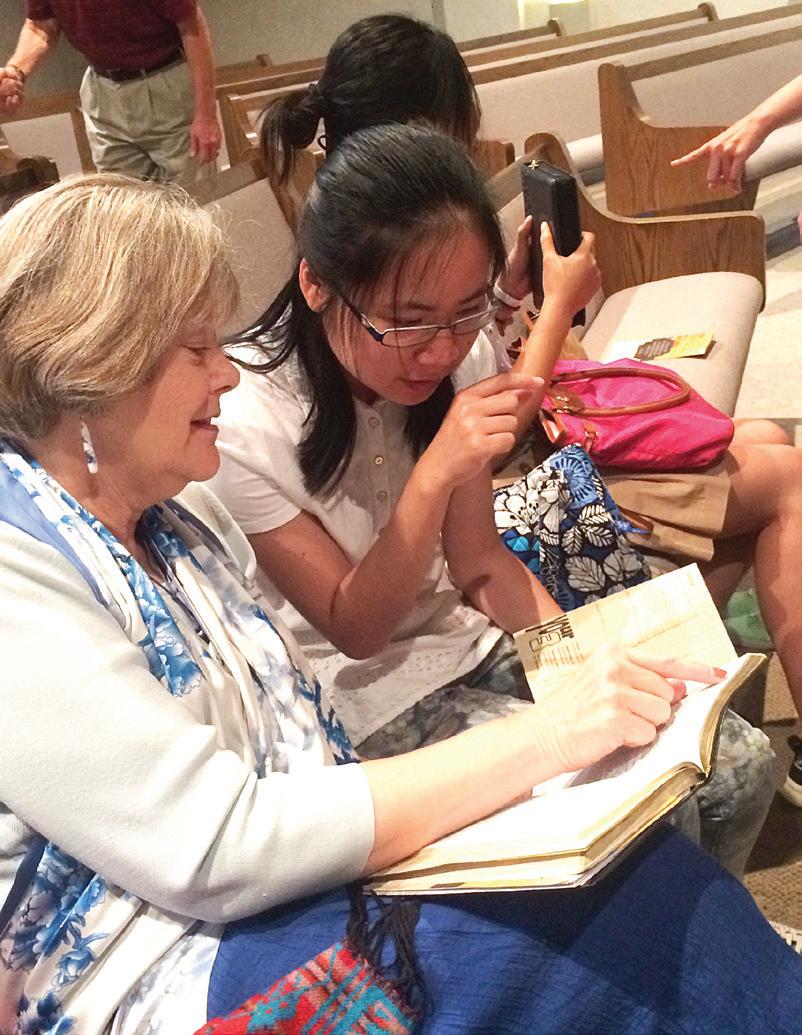
For another girl, this day marks the first time she has ever attended church. And another student, intrigued about what she heard during the service, agrees to a “Christianity Explained” study in hopes of having more of her questions answered.
These are just a few of the examples of spiritual growth Duane and Alice Davis have witnessed over the past several years. Duane, who served as director of missions for East Central Illinois Baptist Association, and Alice, a long-time member of the Woman’s Missionary Union lead team, live in Mahomet, a town just outside of Champaign and the University of Illinois campus.
Four years ago, they got a call asking if they could help a Chinese international student named Echo get acquainted with people in the area—more specifically, with Christians. Echo’s cousin, Tulip, wanted to make sure she got plugged into a Christian community while in the U.S. for grad school, something that had changed Tulip’s life and led her to place her faith in Jesus Christ.
March for Life 2015

A conference dedicated to proclaiming and promoting the sanctity of life will be held in the nation’s capital Jan. 26-28.
The second-annual Evangelicals for Life conference, hosted by the Ethics and Religious Liberty Commission (ERLC) and Focus on the Family, surrounds the annual March for Life on the National Mall on Jan. 27.
At last year’s inaugural Evangelicals for Life, ERLC President Russell Moore explained the motivation behind the event. “Our burden was to see the reborn stand up for the unborn and for all of those who were created in the image of God.” Moore, Focus on the Family President Jim Daly, and other pro-life leaders will speak in large-group sessions on a wide range of topics, including a church’s responsibility to advocate for life, pro-life issues and Millennials, human trafficking, foster care, adoption, ministry to refugees, and more. The conference also includes breakouts and an opportunity to participate in the March for Life.
To register for a free simulcast of conference plenary sessions, go to evangelicals.life/ simulcast.
On Jan. 22, many churches will mark Sanctity of Human Life Sunday. Look for more information in the next issue of the Illinois Baptist, and go to ERLC.com for sanctity of life resources.
– USA Today, Baptist Press
“I said sure, we can take care of that,” Duane remembered. “So we met her at the train station and immediately she just latched onto us.” The couple asked Echo if she would like to go to church with them that first Sunday. She said yes, “and I don’t think she missed a Sunday since,” Duane said.
Echo invited two of her friends to church, and they befriended the Davises too. Over Christmas break, another friend of theirs got acquainted with the couple when he had nowhere to go for the holidays.
“All we said was yeah, we’ll take care of introducing Echo around,” said Duane. “And we became American parents.”
The Davises realized that one of the greatest needs the students had was speaking English. They started conversational English groups on Thursday nights, as a way to offer practical help with the language barrier as well as an opportunity to share the gospel.

The first year consisted of Echo and her three friends. The group grew to seven the following year, then 25. This past school year, they had 60-70 attending each week.
When asked what those Thursday nights look like, student Yewin Yin said, “[We eat] dinner, they tell a Bible story, and then we just talk about it. And we also play games.”
Alice said sometimes there are questions about the Bible story, and other times there aren’t. “The kids that come to us are the ones who are just a little curious,” she said. “They just want to know what it’s about…but it gives them a place to start.”
Six students in the group have come to Christ. Which doesn’t seem like many,
JUST LIKE FAMILY – After agreeing to welcome an international student and show her around their community four years ago, Alice and Duane Davis have become “American parents” to many more students.
Alice said, with 70 students in attendance. But looking at the exponential growth of this group offers perspective: what started as four students has become a movement.
Alice explained that a lot of these kids have never gone to church before. But the Davises have up to 10 attend with them on any given Sunday, and their searching and exploring is an encouragement—even if the couple never gets to see the outcome of the seeds they’ve helped plant. They give them a Bible and answer their questions about what church will be like.
“We’ve never really advertised,” she said. “It’s always been word of mouth and people inviting people. It’s the relationship they have at our house and with us that’s made the difference.”
‘We can take care of that’ Couple’s love for international students started with one ‘yes’
10 IBSA. org Illinois Baptist
LIFE ISSUES
MISSION
A world in motion
The “10/40 Window” is moving, and bringing new evangelism opportunity with it.
BY LISA SERGENT
London | Swirls of vibrant color are everywhere—the fruits and vegetables in the markets and the fabrics draped over the mannequins in shop windows. Gold and gold-toned jewelry is offered up by merchants in a street-side bazaar. The scent of exotic spices fills the air.

Walking down the street I see a Hindu temple, a Sikh gurdwara, halal butcher shops, men in turbans, and women wearing the hijab head dress of the Middle East. The music and language seems foreign, but not what I expected. The sights and sounds of South Asia surrounded me. But I’m not in Asia. This is London. England.
Nearly 8.7 million people live in London. According to the Trust for London, 37% of the city’s population is from outside the U.K., and 13% is from South Asia. Parts of the city have high densities of this population where immigrants have brought and preserved their culture and religions.
On this day, I boarded the Underground subway system with an International Mission Board missionary. We journeyed into one of these areas to see where she works and meet the people she ministers to. I’ve met high security missionaries before, but always in the United States while they were back on furlough from their risky foreign mission fields. This was my first experience working with a high security missionary on her own mission field. Again, my surprise is that this high-stakes field is in London.
The great migration of peoples in the last decade has, quite literally, brought the world to our doorsteps. The region called the 10/40 window stretches across Asia and Africa, between the 10th and 40th latitudes north of the equator. More than 2 billion people in this region have little or no access to the gospel. They are mostly Muslims, Buddhists, Hindus, or animists. Reaching them with missions personnel is limited, difficult, and dangerous.
But reaching these people groups in the global population centers where many of them are relocating is easier. It’s still done undercover, for the safety of the new Christians and the missionaries, but the gospel is being shared. I saw it in London.
God had it planned
Irene Wayne* worked with South Asians in their home country for many years. When her visa renewal request for
that country was denied, she transferred to London. Wayne was sad at having to leave the people group she loved but knew that many of that same people group had also made the move to London over the years.
“Some days I forget I’m not back there,” Wayne said as we walked through the streets. “The bazaar and market are just like back there.”
Along the way we met a few people she knew. Wayne was always careful to introduce me as her friend visiting from the United States. I had come to learn more about the people in their part of London, she told them. Throughout the afternoon I was very guarded about what I said and felt protective of Wayne. I didn’t want to do anything that might jeopardize her or her ministry. I couldn’t imagine how it would be live in such a secretive way every day.
One of the places we stopped was a Sikh place of worship called a “gurdwara.” We approached through the women’s entrance, removed our shoes, and covered our heads as instructed. We were told all were welcome and we were free to approach what

Continued on page 12
(Editor’s note: On her recent visit to London to learn about the International Mission Board’s new strategies, our Lisa Sergent found the city was in some ways less “British” than she expected. She discovered a city where 4-in-10 residents are from outside the United Kingdom. She also found this mass migration presents excellent opportunity for evangelism for non-Christian people groups.)
The ‘gurdwara’ (above) is a gathering place for Sikhs and others in the community. There, guests can observe worship ceremonies or have tea and sandwiches. Christian missions in this area are done privately for security reasons.

IBSA. org 11 December 26, 2016
CULTURE CLASH – Shops in this section of London (top) offer saris and colorful scarves to the southeast Asian residents who have made the neighborhood their own.
FULL REGALIA – “You should have seen me yesterday,” the Sikh man said outside their London temple, “when I was really dressed up.”
Continued from page 11
looked to me like the altar area. I could see something encased in glass and draped in white cloth. An elderly woman sat behind it and waved a large plume fan as musicians played to her left. To her right were more glass cases with white cloth. That’s their holy book, Gur Granth Sahib, Wayne said, which Sikhs revere as “the living guru with all the answers to life.”
“I work with national partners to help meet peoples’ needs,” she said as we went to another location. There, I was introduced to a small group of Christians from her South Asian people group. They had suffered much for their belief in Christ, but were joyful. An elderly man insisted on serving us Chai tea and cookies while a woman shared her story of converting from Hinduism to Christianity.
“We isolate from family; we don’t tell them,” our host said. “There is so much fear in England and back in our native country. Some even feel shame.
“Many are baptized secretly,” the woman shared. “Their own spouse doesn’t even know.”
Wayne told me how common it is for women to be beaten by their families for trusting Christ as their savior. Some would drift away, back into the shadows. She told of one woman, who suffered greatly at the hands of her family, but when Wayne last saw her, the woman hugged her and whispered into her ear, “I still believe.”
GOSPEL MINISTRY IS HARD WORK. OUR MDIV SHAPES YOU FOR THE TASK.

The cultural and theological challenges of the 21st century demand more rigorous training for effective ministry. At TEDS, we’re looking for students willing to embrace the challenge of going deeper in their understanding of Scripture and in ministry preparation, all within a community that will require their best.
We invite you to intensive preparation, where you will gain essential training in Scripture interpretation, theology, pastoral practices, leadership, preaching, and spiritual formation. Our new curriculum is also designed to help you develop skill in cultural exegesis and a deepened Christian worldview that will equip you to engage with diverse peoples and cultures for the gospel’s sake.

Our new MDiv curriculum begins Fall 2017.
Learn about full-tuition scholarship opportunities at teds.edu/mdiv

“It’s OK to believe Jesus Christ as one of many Gods,” our host said, describing her own Hindi family’s view, “but to baptize and believe in him as the only God is unacceptable.” Her sister who became a believer was beaten by family members.
Despite the hardships, such joy still radiated from her face. I reached out and we stood hugging each other, sisters in Christ. I thanked her for sharing her story with me and we prayed together.
After parting from Wayne, I took the Underground to meet up with other editors on the trip. I went on the trip expecting to love England and its people, which I did, but I also came away with a love for an Asian people group, far from home, and for the missionary trying to reach them for Christ. Half a world away, God brought my new missionary friend and her people group together again, that her gospel-sharing work among them might continue. And it does.
*Name changed for security reasons
12 IBSA. org Illinois Baptist
ENTRUSTED WITH THE GOSPEL TO SERVE THE GLOBAL CHURCH
FINDING A PLACE – At London’s Borough Market, in a neighborhood studded with British landmarks, a man grills sweet corn he grew at his farm in Essex. This “Old England,” though, stands in sharp contrast with other parts of the city, where immigrants from around the world are putting down new roots.
Stop waiting for ‘the voice’
In the church I grew up in, “missionary” was a sacred and scary title, bestowed only upon the spiritual elite, the Navy Seals of the Christian world. We considered them heroes, sat in awe through their slideshows, and gladly donated our money to their ministries.
It was years later that I first realized that every Christian was a missionary, that all Christians were called to leverage their lives and talents for the kingdom. God’s calling into mission is not a separate call we receive years after our salvation; it is inherent in the very call to salvation. Every believer is given a spiritual gift and a role to play in the spread of the Great Commission. “Follow me,” Jesus said, “And I will make you fishers of men.” That’s for everyone, not just those who feel a special tingly feeling they interpret as the call of God, or those who see some message from heaven spelled out in the clouds. Too many Christians sit around waiting on a “voice” to tell them what God has already spelled out in a verse.
Another way to put it: The question is no longer if we are called to leverage our lives for the Great Commission; it’s only where and how.
When “normal” Christians embrace this idea of calling, the gospel spreads like a prairie grassfire. Luke, the writer of Acts, goes out of his way to show us that the gospel travels faster around the world in the mouths of regular Christians than it does through full-time, vocational Christian workers. Luke notes, for example, that the first time the gospel left Jerusalem, it was not in the mouths of the apostles. Regular people “went everywhere preaching the word,” while the apostles stayed in Jerusalem (Acts 8:1–4). The first time the gospel actually went out into the world, not a single apostle was involved.
• The first “international mission trip” was taken later in that same chapter by Philip, another layman. The Spirit carried him to a desert road where he met an Ethiopian government official, and Philip led him to Christ.
• The church at Antioch, which served as the hub for missionary activity for the last half of the book of Acts, was not planted by an apostle, but simply “some brothers,” whose names Luke did not even bother to record—presumably because no one would have known whom he was talking about.
• Apollos, a layman, first carried the gospel into Ephesus, and unnamed brothers first established the church at Rome. These Christians didn’t travel to Rome on a formal mission trip, but were carried there through the normal relocations that come with business and life. As they went, they made disciples in every place (Acts 8:5–8; 18:24–19:1; 28:15).
As the historian Steven Neill notes, “Nothing is more notable than the anonymity of these early missionaries.…Luke does not turn aside to mention the name of a single one of those pioneers who laid the foundation. Few, if any, of the great Churches were really founded by apostles. Peter and Paul may have organized the Church in Rome. They certainly did not found it.”
The next wave of missions will be carried forward, I believe, in much the same way—on the wings of business. Consider this: If you overlay a map of world poverty
with a map of world evangelization, you will find that the areas most in need of business development are also the most unevangelized. Many of the most unreached places in the world, most closed to Christian missionaries, have arms wide open to any kind of businessmen.
Missiologists frequently refer to a “10/40 window” in which the most unreached peoples live (lying between the 10 and 40 degree latitude lines). For business leaders, the 10/40 window isn’t a window at all; it’s a wide open door. God may not call you to leave the United States (though he might!). But if you’re a believer, he is calling you to follow him where he goes, as he seeks to make his name known. Whether you’re an investment banker or a full-time pastor, a stay-at-home mom or an overseas missionary, God has a mission for you. From RaleighDurham to Bahrain, the responsibility to think that way belongs to every believer. As we often say, “Whatever you are good at, do it well for the glory of God, and do it somewhere strategic for the mission of God.”
It’s time for the “ordinary believers” in our churches to recover the understanding that they are called to the mission and shaped by God for a specific role in that mission. The question is no longer if we are called to leverage our lives for the Great Commission; it’s only a matter of where and how.
J.D. Greear, Ph.D., is pastor of The Summit Church in RaleighDurham, N.C., and author of “Gaining by Losing: Why the Future Belongs to Churches that Send.”
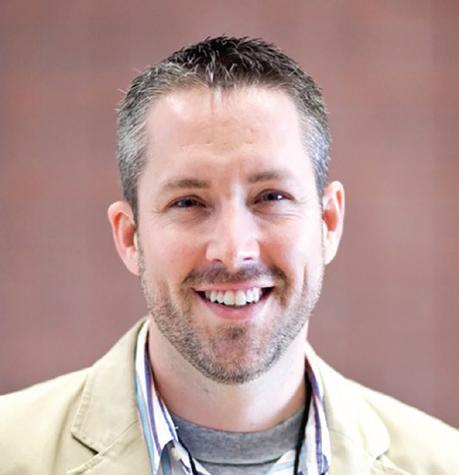

Keep Christmas alive
t feels so wonderful! The spirit of Christmas adds oomph to life. We live in anticipation and we’re even nice to strangers. We become very intentional about giving to others. But as we turn the calendar page to December 26, does that Christmas spirit fade? As you pack up those Christmas decorations, consider these five simple reminders to help keep that spirit of joy and generosity at the forefront all year.
1. Live expectantly. Anticipation is at a high during Christmas, but a sense of expectancy is a good thing all year long. It keeps us on our toes, helps us use time wisely, and reminds us to lean on God. So, live with enthusiasm every day of the year. “Don’t burn out; keep yourselves fueled and aflame. Be alert servants of the Master, cheerfully expectant” (Romans 12:11-12a MSG).
2. Be extra nice to strangers. Are you kinder to total strangers at Christmas? Your job as a Christian is to be God’s ambassador, representing him with your every word and deed. Take your ambassador job seriously all year long. Be nice to strangers.
3. Practice a “shoebox continuum.” Wasn’t it awesome to stuff gifts in shoeboxes for Operation Christmas Child or backpacks for Appalachian children? Don’t stop. Each month this year, gift a carefully prepared backpack or box to a local child in extraordinary need. Include a “God loves you” note.
4. Engage in better benevolence. Use Christmas ministry projects as a springboard to yearlong generosity. For example, instead of a give-and-run delivery of gifts or dinner for a local needy family, make a plan to show God’s love to them all year. Get to know them. Listen to their story. Invite them to church and welcome them. Pray with them. Introduce them to Jesus.
5. Smile freely. The Christmas season lends itself to joy. Joy isn’t seasonal for a Christian. It radiates from inside, and it’s there on happy days and desperate days, on New Year’s Day and Groundhog Day and every other day of the year. Radiate the joy of Jesus in non-December months.
The “spirit of Christmas” is not a December event. It’s a Christian’s lifestyle and mission. It’s our every-day marching orders from Christ. Exude the true Christmas spirit—God’s Spirit—as you live with joy, expectancy, love, and generosity.
© Diana Davis, dianadavis.org
 DIANA DAVIS
DIANA DAVIS
I
IBSA. org 13 December 26, 2016 fresh ideas table talk
Too many Christians wait to hear what God has already spelled out in a verse.
“Excuse me... I would prefer to hear the pastor’s New Year’s sermon about change and reinvention while seated in my regular pew.”
Baptist preacher’s diary details 1868
Ewing | The unsigned 1868 diary of early Illinois Baptist educator and preacher John Washburn went unidentified for years at the Hamilton County Historical Society in McLeansboro. Its recent discovery and subsequent printing offers a unique perspective on mid-19th century life and ministry.
Washburn was one of the founders of a Baptist school, Ewing High School, which started in the building of Ewing Baptist Church in 1867. (The school eventually became a college and served students until closing in 1925.) The same year Ewing High School began, Washburn started preaching in churches in the area.
Along with details about the school and his ministry, the 1868 diary shares entertaining tidbits about his life and marriage, and how ministry required adaptations to both. From a January 6 entry where Washburn describes his habit of writing at night:
“Irene, my dear wife, becomes very much irritated at my late hours and the scratching of my pen and uses some rather uncomplimentary language, which by the grace of God I am able to bear without returning a word or having an unkind feeling.”
The couple seems to have made up by May 10, when Washburn
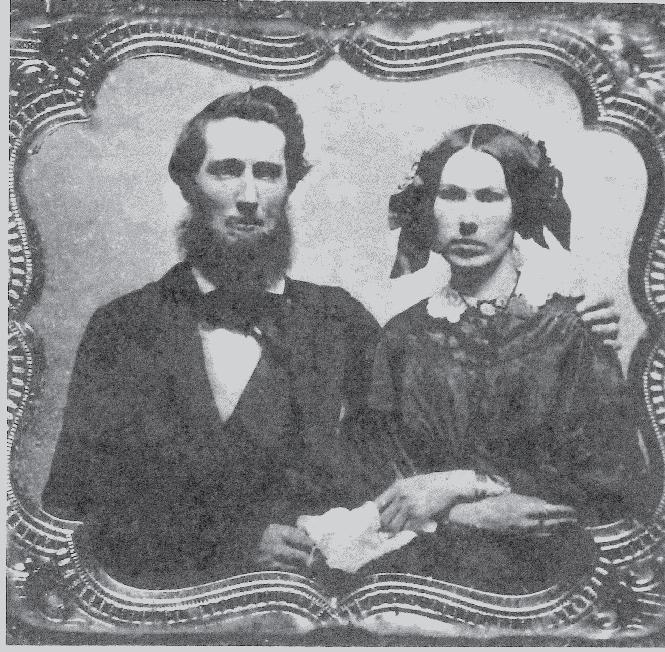
received a gift of $1.50 for preaching at the church in Benton. “On coming home, I give it to my dear wife,” he writes.
Washburn’s detailed notes also provide an economic picture of the time, and what it meant to juggle the roles of teacher, preacher, and farmer. He describes plowing the ground for wheat and taking eggs to market, as well as how much cash he had on hand most days, and what goods cost in 1868 (15 cents for 2/3 lb. of halibut, 30 cents for a gallon of coal oil, 10 cents for a New Testament for his son).
Washburn later pastored several churches in Illinois, including First Baptist, McLeansboro, and Ewing Baptist, where he was serving when he died in 1905. The diary’s introduction shares the words of William Throgmorton, first editor of the Illinois Baptist, about Washburn’s life and ministry:
“As an educator, Dr. Washburn has few superiors….As a preacher, he is earnest and plain, yet able. As a pastor, he is greatly loved. His lovable character as a man gives him great influence with people.”
For more information about John Washburn’s diary, contact the Hamilton County Historical Society in McLeansboro.

New Starting Point
In December, Starting Point Baptist Church in Chicago purchased the building they’ve been meeting in over the past year. The story of how they got there, though, actually begins with another church.
Feeling led to dissolve their small church, Lamon Avenue Baptist Church members worked with the Baptist Foundation of Illinois (BFI) to create a legacy fund that will support church planting and other missions and ministry causes. Then, they turned their building over to BFI, who sold it to Starting Point. The church, led by Pastor Jonathan de la O, will contribute the cost back into the legacy fund.
Pictured at left: BFI Executive Director Doug Morrow, Emely and Jonathan de la O, John Paul Moring and Stephen Hau from Lamon Avenue Baptist Church.

churches
Celebrating 100 years
New Harmony Baptist
Church in Centralia celebrated its 100th anniversary this fall with a weekend of worship services and special events.
The church actually got its start in 1915 as a Sunday school for children in Centralia. According to the church history, adults started attending the Sunday school and recognized the need for a church. New Harmony, then called Second Baptist Church of Centralia, was officially organized on September 23, 1916.
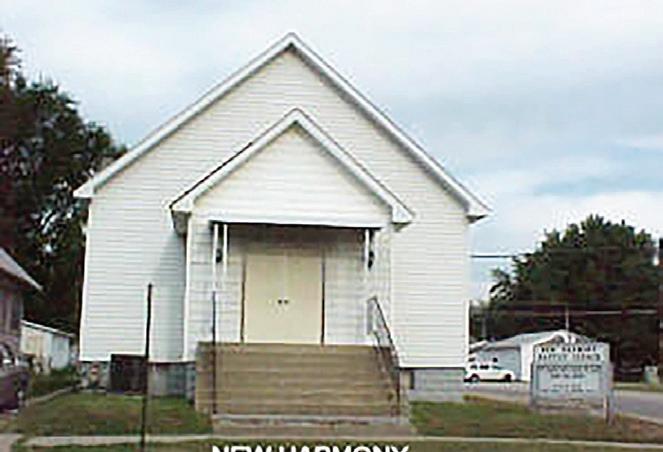
In 1920, the church moved to its current location at the corner of North Poplar and Rasback in Centralia. And the next year, the congregation got a new name when a member from New Harmony, Indiana, said she would buy a new piano for the church if they changed the name to reflect her hometown.
New Harmony Baptist Church currently is led by Pastor Ray Tackett.
Important Year-End Information
Now is the time to double check your records to ensure all your church’s gifts given through IBSA have been credited to the proper designations so corrections can be made before the end of the year. Any changes or contributions received in the IBSA office by January 5, 2017, will be included in 2016 giving. Gifts received after this date will be credited as 2017 giving. Please contact Kendra Jackson at (217) 391-3111 or e-mail kendrajackson@ibsa. org if you need assistance. Thank you.
Macedonia Baptist Church of rural Casey, is seeking a bivocational pastor to share God’s Word and lead his flock to a better and more functional Christ-centered life. Those interested in this type of ministry, please send resumes to Macedonia Baptist Church, Attn: Pulpit Search Committee, P.O. Box 55, Casey, IL 62420.
Marshall Baptist Church seeks a 30-hour per week director of student ministries who will work to foster a strong education program with teachers, students, parents, and church leaders. E-mail resumes and questions by January 1 to twtharp@frontier.com, Attn: Personnel Committee.
Baptist Children’s Home and Family Services is seeking a couple without children to serve as relief houseparents in Carmi. The couple would work four days per week between two boys’ cottages, providing relief for primary houseparent couples. An apartment is available for days off. This is a full-time job with benefits. Contact melinda.bratcher@bchfs. com, and go to bchfs.com for more information about the agency.
more information on ministry positions at IBSA.org/connect Send NetworkiNg items to IllinoisBaptist@IBSA.org
NeTworkiNg Find
14 IBSA. org Illinois Baptist
PIONEERS—Dr. John and Irene Washburn lived in Illinois in the mid-19th century, when John helped found a Baptist school and led churches in the region.
EVENTS
January 12, 17, February 6-7
Tax Seminars
What: Valuable tax info for current and retired ministers, treasurers, and leaders

Where: Jan. 12: FBC Marion, 7-9 p.m.;
Jan. 17: FBC Effingham, 7-9 p.m.;
Feb. 6: Gateway Association, 7-9 p.m.;
Feb. 7: IBSA Building, 8:30-11:30 a.m. and Immanuel, Lemont, 7-9 p.m. Register: IBSA.org/church_health


Contact: SylvanKnobloch@IBSA.org
January 24-25
Illinois Leadership Summit
What: Training for ministry and outreach leaders. Ask your association’s DOM or moderator about an invitation to attend.
Where: IBSA Building, Springfield
Register: IBSA.org/summit

Contact: BarbTroeger@IBSA.org
February 9
iConnect: IBSA/Pastors Meet-Up
What: Introduction to IBSA staff, ministries, and training for pastors and church staff members
Where: IBSA Building, Springfield
Contact: BarbTroeger@IBSA.org
February 10, 20-21
Rekindling the Call Retreat
What: Free retreat for pastors and wives
Where: Feb. 10: Streator Baptist Camp, 8 a.m.-5 p.m.; Feb. 20-21: IBSA Building, Springfield, noon Monday to noon Tuesday
Register: IBSA.org/church_health
Contact: SylvanKnobloch@IBSA.org
February 18
Church Technology Conference
What: Learn how to use technology for worship and outreach at this retreat, 9 a.m.-2 p.m.
Where: IBSA Building, Springfield
Cost: $10 per person, includes lunch
Register: IBSA.org/worship
Contact: SteveHamrick@IBSA.org
February 25
VBS Clinic-Central Illinois
What: Training in age groups, music, crafts, missions, and more for this summer’s “Galactic Starveyors” curriculum, registration begins at 8 a.m., clinic concludes at noon.
Where: Emmanuel Baptist, Carlinville
Info: IBSA.org/kids
Contact: CathyWaters@IBSA.org
Don’t get cooped up in debt
QWe’re completely debt-free with a fully funded emergency fund, and we have $350,000 in the bank from a land sale. My wife and I would like to buy a chicken farm and upgrade it to contract standards. This—plus the stock—would cost around $290,000. I would keep my regular job, and my wife would run the farm. An investor friend of mine said I should finance the entire purchase. What do you think?
AEither do the deal with cash, or don’t do it at all. Your investor friend is wrong, and there’s a good chance he doesn’t have nearly as much money as you do. He’s probably got more bad opinions than dollars. Now, the pro formas on the kind of thing you’re talking about are incredible. They can make a ton of money, but they’re a lot of work—I mean real, hard work. Some are more high-tech than others, and that can mean a little
less work, but someone’s got to be out there every day with their hands on this thing or you’re going to be in trouble. I don’t know the ideas you have for divvying up the work, but I’m afraid it would just be too much for one and a half people. I don’t mind you doing the deal, as long as you pay cash for it. But if you’re looking to invest, there’s always real estate—it seems like you’ve done pretty well there—or maybe another small business idea. Whatever you do, you need to stop listening to your friend about borrowing money. You’re liable to turn what was a blessing into a curse if the two of you go borrow money on a chicken farm.
Financial advisor Dave Ramsey is a prolific author and radio host.
 E. Calvin Beisner, Ph.D.
E. Calvin Beisner, Ph.D.
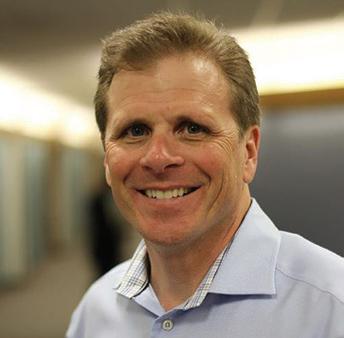
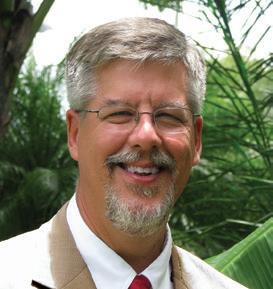
Founder & National Spokesman, The Cornwall Alliance for the Stewardship of Creation www.cornwallalliance.org
for an hour!”
— Dr. Wayne Grudem, Scottsdale Bible Church
“I’ve known two people in my life whose knowledge I would describe as encyclopedic. You’re one of them!”
— Dr. R. Fowler White, Dean of Faculty, Knox Theological Seminary
“The people loved his lectures, with many … wishing that he could have spoken more.”
— Rev. Phil Kayser, Providential History Festival, Omaha, NE
IBSA. org 15 December 26, 2016
DAVE RAMSEY
What’s True, What’s False, What’s Our Responsibility? Contact Us: 708-781-9328 | www.illinoisfamily.org Forum April 26th Arlington Heights April 27th Orland Park April 28th Peoria
Change & the Christian What others say about Dr. Beisner “… an excellent speaker who … held my 200-person Bible class spellbound
Climate
dave says Saturday, February 18, 2017 10:00 AM - 3:30 PM Village Church of Barrington | 1600 E. Main St., Barrington, IL Dr. Turek is a dynamic speaker, award-winning author and the president of CrossExamined.org. His books include Stealing from God: Why Atheists Need God to make their Case; I Don’t Have Enough Faith to be an Atheist; Correct, Not Politically Correct; and Legislating Morality. He presents powerful and entertaining evidence for Christianity and has debated prominent atheists including Christopher Hitchens and David Silverman, president of American Atheists. Worldview Conference Biblical Training for Today’s Culture Third Annual Contact Us: 708-781-9328 | www.illinoisfamily.org Politics How to respond to “Gender Confusion” Does Absolute Truth Exist? Atheism’ Burden of Proof Apologetics Religious LIBERTY LGBTQ Contradictions Politically Incorrect $20 per person/$50 per family/Student Scholarships Available Featuring Dr. Frank Turek
Let’s talk about it
QA small but significant group in our church holds a different view on women in church leadership. They keep saying the rest of us are behind the times and we’re going to lose our young people if we don’t change. I say the church’s position is biblical and in line with The Baptist Faith & Message—but I don’t want to split the church over it.
Church needed here...
Location: Des Plaines
Focus: Large populations of South Asian, Eastern European, and Hispanic peoples
Characteristics: This middle-class Chicago suburb of nearly 60,000 people is located just north of O’Hare Airport. Every Eastern European country is represented in its population. The city’s fastest-growing groups are northern Indians and Hispanics.
Prayer needs: Pray that God would raise up workers from among the people and language groups in Des Plaines to plant gospel-proclaiming churches.
Looking ahead
PAT PAJAK
AWomen have great leadership skills and spiritual gifts that are often overlooked and wasted, simply because of a misunderstanding and misinterpreta tion of a woman’s role in the church. While Southern Baptists have long held the position that the offices of deacon and pastor are to be held by males, that does not prohibit women from doing ministry in every other area in the church.
Since every church is autonomous, I suggest the church form a study group and research the plethora of opinions concerning this matter. Hold a churchwide discussion when the various views can be presented. Be sure to include some women on the panel.
Teacher Appreciation Day
QOur pastor homeschools his kids. That’s fine, but sometimes his enthusiastic support of homeschooling feels like criticism of public school parents and teachers. I’ve talked with him about it, but he still tells a lot of homeschooling stories in the pulpit.
APerhaps you could suggest a Sunday service that honors school teachers. Encourage teachers who are members of your congregation to invite colleagues from their school. Make it a big event—notify the community newspaper, print flyers or posters to be put up in the schools, plan a meal following the service, and use teachers to sing special music, share their testimony, or put on a small drama.
Give each teacher that attends a New Testament and certificate of appreciation—and invite homeschooling parents to participate. Your community’s teachers will long remember that your church took time to honor them and at the same time, it will show the teachers in your church that the pastor appreciates ALL educators, not just homeschoolers!
Pat Pajak has pastored churches of all sizes across Illinois. He currently leads IBSA’s Church Consulting Team. Send questions for Pat to IllinoisBaptist@IBSA.org.
“Brothers, I do not consider myself to have taken hold of it. But one thing I do: Forgetting what is behind and reaching forward to what is ahead” (Philippians 3:13).
The new year is upon us. During this time, we are filled with reflections of the past year and expectations for the new year. We recall the high points and achievements, but also acknowledge the failures and missed opportunities. Many of us will contemplate our faith journey with the Lord and will conclude as Paul did, that we have not taken hold of it yet.
Like Paul, we need to become focused, recognizing that the past is the past and cannot be undone. This means not only moving past our disappointments, but also moving on from our successes. Our sins and mistakes can be anchors to drag us down, but resting on our laurels and spiritual victories can create complacency and a false sense of accomplishment.
So, let us not look back but stretch forward in reaching the lost with the gospel and serving others for the glory of God. We also need to consider that each new day, let alone a new year, is an opportunity to become more like Jesus. That was Paul’s desire—to be like Jesus. May it be ours as well.
PRAYER PROMPT: Oh, Father, may you perfect your sanctifying work in us through the indwelling presence of your Holy Spirit. Amen.
Kevin Carrothers serves as pastor of Rochester FBC and president of IBSA.
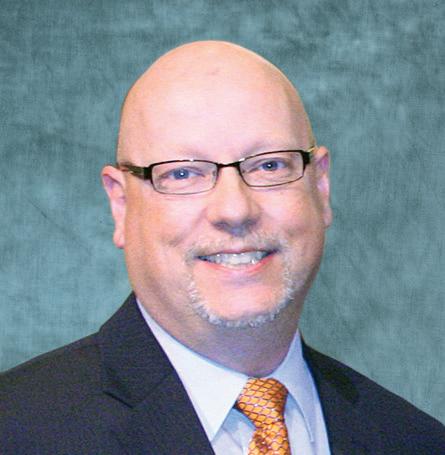
Pastors, join the IBSA Pastors’ Prayer Room on Facebook. E-mail oweaver7307@ gmail.com.
illinois religious landscape

Aid to the poor
52% 42% 5%
of adults in Illinois say government aid to the poor does more good than harm
say it does more harm than good say neither, or they don’t know
– Pew Research
Illinois Baptists gather in Springfield for this major leadership training event. Learn to make your church more effective in ministry and outreach.


Featured teacher: Mac Lake is a leadership expert specializing in church growth, personal development of leaders, and creation of the leadership pipeline. Learn more about Mac at maclakeonline.com.
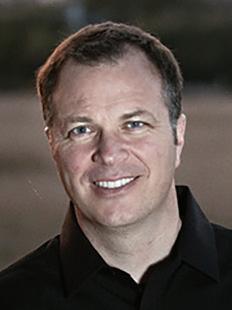
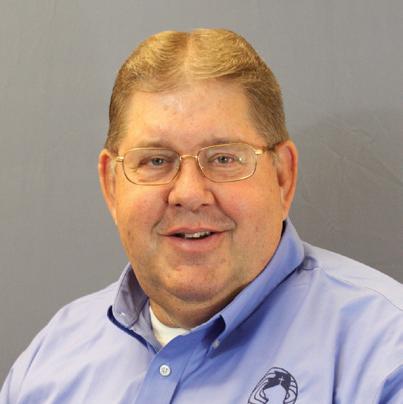
16 IBSA. org Illinois Baptist
devotional Pat’s Playbook
KEVIN CARROTHERS
Jan. 24-25 | IBSA Building, Springfield Contact BarbTroeger@IBSA.org or call (217) 391-3138

















































 DIANA DAVIS
DIANA DAVIS








 E. Calvin Beisner, Ph.D.
E. Calvin Beisner, Ph.D.







